Business
How The Atlanta Jewish Film Festival Comes to Life Virtually & In-Person
Published
3 years agoon
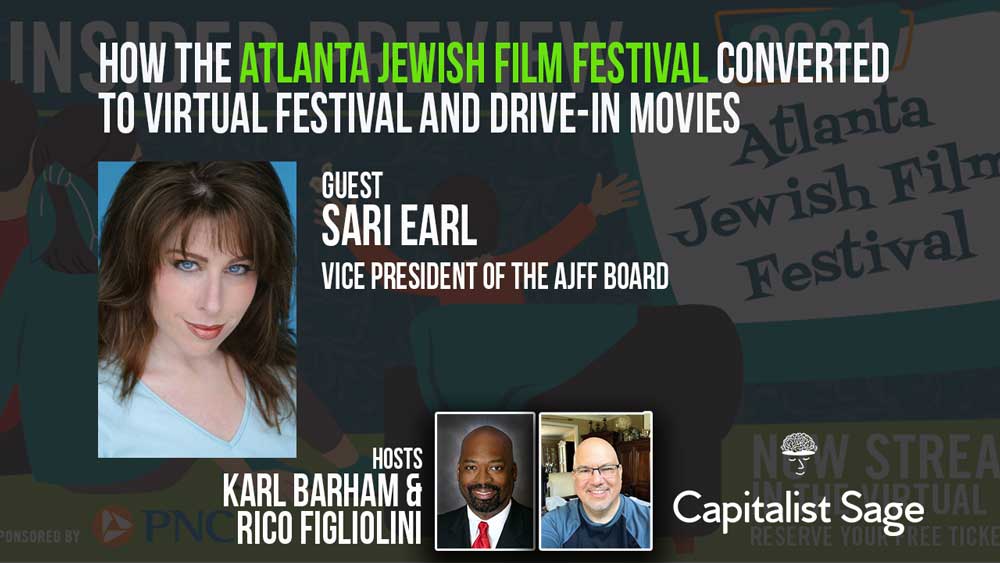
Learning to run a virtual film festival with drive-in movies too, for the first time isn’t easy? The Atlanta Jewish Film Festival is back and better than ever! Karl Barham and Rico Figliolini are joined by Sari Earl, the vice president of the Atlanta Jewish Film Festival board. For years the AJFF has been bringing great films to Metro Atlanta and on this episode listen in to explore how they’re doing a film festival in a pandemic and socially distanced environment.
Website:
https://www.ajff.org
New Website: https://ajffrecommends.org
Social Media: @AJFFAtlanta
Timestamp:
[00:00:30] – Intro
[00:03:17] – About Sari
[00:07:10] – Changing Perceptions
[00:13:20] – Going Virtual
[00:18:09] – Ideas to Take into the Future
[00:22:33] – How Films are Selected
[00:24:35] – Cost of Films
[00:26:53] – Getting Involved
[00:27:58] – Film Recommendations
[00:32:11] – Closing
“I have always been drawn to the mission of the film festival, which is the bridge building. Bringing people together, digging into a topic, and then unpacking it together with a guest speaker. To me that’s really exciting, but it’s the first time where I really think, art is more than art. Art is human and it’s a human connection. And it really spoke to me. It was great.”
Sari Earl
Podcast Transcript
Karl: [00:00:30] Welcome to the Capitalist Sage podcast. We’re here to bring you advice and
tips from seasoned pros and experts to help you improve your business. I’m Karl Barham with
Transworld Business Advisors, and my co-host is Rico Figliolini with Mighty Rockets Digital
Marketing, and the publisher of the Peachtree Corners magazine. Hey Rico, how are you
doing?
Rico: [00:00:48] Good, Karl. How are you?
Karl: [00:00:50] I’m doing well. I’m excited. This is one of my favorite times of years, film festival
time. And today we are going to have a great discussion with Sari Earl, the vice president of the
Atlanta Jewish film festival board. And we’re going to talk about some of the exciting things
that’s coming this year to Atlanta and the film festival. So I look forward to having that chat.
Sari: [00:01:15] Thanks for having me, Karl. Thanks Rico. I really appreciate you having me.
You have a great show and I’m glad to be here.
Karl: [00:01:21] Awesome. Why don’t we introduce our sponsor before we get into our
conversation with Sari today?
Rico: [00:01:27] Sure. Our sponsor is Hargray Fiber. They’ve been a sponsor of both Peachtree
Corners magazine, and for the family of podcasts that we do. And this year they are the, they
introduced the Hargray Economic Stimulus Plan. Just like the federal government has one,
Hargray has one. They’re an internet cable company that provides fiber optic, fast internet
connection and business solutions for not only small businesses, but enterprise sized
businesses. So the economic stimulus plan, real simple it’s one year free of business, internet,
and phone service for those that qualify. So check them out there at
Hargray.com/business/economic-stimulus, and find that website, check them out. Look at what
they’re doing. They’re here in Peachtree Corners. They’re all over the Southeast. They’re not
like the cable guy. They’re really committed to the communities that they’re in. So check them
out, Hargray Fiber.
Karl: [00:02:32] There isn’t a business today that should not have great internet speed, making
sure that their fiber optics is working and they’re able to communicate. Whether they’re working
from home or they want to keep that speed up at their place of work. So I’m really grateful to
Hargray Fiber for all they’re doing in the community and helping businesses with this great
stimulus package.
Rico: [00:02:53] Absolutely. So I just also want to say one other thing. We are a sponsor of the
Atlanta Jewish film festival with the Peachtree Corners magazine and the latest issue that came
out. So I just want to let everyone know that, you know. And I’ll tell them how great the website
is when we get to it. But it’s a great film festival. So I’m excited to have Sari on.
Karl: [00:03:17] Well today’s guest, Sari Earl is the vice president of the Atlanta Jewish Film
Festival board. And for years they’ve been bringing great films to the Metro Atlanta and beyond
community. And today we get to talk about this year’s film festival, some of the interesting things
they’re doing. And even get to explore how we’re doing this in this pandemic environment, this
socially distanced environment. Lots of great options for you to get out and see some films. So
we’d like to welcome Sari to the podcast. How are you doing today?
Sari: [00:03:52] I’m great. Thanks for having me.
Karl: [00:03:54] Why don’t you tell us a little bit, start off by telling us a little bit about yourself.
What do you do when you’re not enjoying great films and tell us how you made it to Atlanta?
Sari: [00:04:03] I’m originally from Brooklyn, just like Rico. And moved down here to attend
Emory law school. I stayed and got my master’s in laws and taxation. And then I worked at Delta
as in-house counsel. I worked for another trade association. And ultimately turned to writing.
And I’ve been a professional writer ever since. I’ve published about 10 books, some fiction,
some non-fiction. I love to try new ways of writing. I’ve written a screenplay and I got involved
with the festival a number of years ago. Mostly through the community building. The American
Jewish committee created the film festival originally, and they have a black Jewish dialogue, a
Baptist Jewish coalition. They have just amazing events and programming, but it’s really about
the interconnecting of our communities. And so the film festival was a program that was so
successful at bringing people together. That we kind of outgrew our founder and partner
American Jewish committee, and we became our own non-profit. And once we did that, like the
partnership with American Jewish committee is so strong and it’s a huge balance. Because yes,
we’re a film festival, but we are focused on our community and our wider community. We
conversed over Jewish films, but the topics are wide ranging and a large percentage of our
audience is not Jewish. And we love that. So typically on a typical year, non COVID year, I go to
the film festival with my friends. As an example, I have a friend who’s an atheist, one who’s in
Hindu and one who’s Catholic. I am Jewish. We all go together, we pick certain films and then
afterwards we debrief about how we process them. And it’s that kind of magical experience that
we’ve done year after year. We love it. As soon as the program guide comes out, people start
circling what they want. I get emails from people I’m going to this one, I’m going to that one. But
also the other thing that really gets me excited about it, are the Q and A’s. We bring in these
guests and we get guests that you’re really not going to hear somewhere else. One of my
earliest guests that I remember so clearly was, it was a film about a Mossad agent, an Israeli
spy who went to go work in Egypt to try to uncover nuclear ambitions in Egypt. And he had a
family in Israel and then he had a family for his undercover work. And the film was about what
happened to him. Great story. At the end of the film, we got to talk to his son about the impact of
his father being a Massad spy on his life. It was fascinating, fascinating. So we get really good
conversations going.
Karl: [00:07:10] I think in particular this past year, if there was a time where people needed to
one, be distracted from the day-to-day through film and through art. And at the same time, bring
people together through shared experiences and seeing artists’ stories and visions and seeing
how it’s received. It’s been this year. And I think, you know, I think many people I talk to have
missed films on a mass scale. And especially the independent ones that are story-driven plot
driven, performance driven stories. We all love the Marvel big, fantastic. But those quieter, that’s
where a lot of people learn about other cultures. And I think the work that you’re doing and the
film festival does to bring that together is amazing. So I’m curious, you know, and do you have a
favorite film that you’ve seen over the past few years that brought a different insight to
something that you may not have, the film fundamentally changed the way you perceived a
person or people or culture or something of significance?
Sari: [00:08:28] Absolutely. The first one that pops into my mind is why culture, why art? And I
remember watching, it was a documentary about the Warsaw Ghetto during the Holocaust and
how people were starving in the streets. People were suffering such indignities by the Nazis.
And during that time they chose to put on theater productions. And I’m thinking, this is the worst
of times, you’re in the worst of places. Who’s thinking about putting on a show? And something
clicked. What was happening is they wanted to keep their sense of joy and play and culture.
And so they put on Yiddish theater in the middle of a Holocaust. And for me, I have always been
drawn to the mission of the film festival, which is the bridge building. Bringing people together,
digging into a topic, and then unpacking it together with a guest speaker. To me that’s really
exciting, but it’s the first time where I really think, art is more than art. Art is human and it’s a
human connection. And it really spoke to me. It was great.
Karl: [00:09:46] Absolutely. I remember watching a film some years ago. And I think it was about
Indian culture, this particular one. Have you heard of the ones that follow water? I think earth,
fire. I remember watching them. They’re just great films and they’re based on books, great films.
But it gave you an insight into a culture that you didn’t see every day. But I remember it made
me reach out to people and want to get to know them and their culture and experience more of
that. And I think the film festivals like this that brings those types of elements together is going to
be the way that a lot of young people are going to really get to learn about people that are
different from them, or grew up differently from them which might make them curious to go meet
more people and get to understand more people. Which is a lot of what we could probably use
now after the past year. People got disconnected, socially distanced. And how do we start
bringing them back together.
Rico: [00:10:45] No, it’s interesting. Go ahead.
Sari: [00:10:48] Sorry Rico. It is really interesting. I mean, the film festival has a lot of films that
are international. We have films from Israel, you know, I have the list here, but it’s a huge list.
We usually have a German films, a lot of German films. Spanish films, Japanese films. So we’ve
had the directors come in. It’s been really exciting, but what I like about it is that I would not
otherwise watch a foreign film, just not my cup of tea. And here through the Atlanta Jewish film
festival, it’s been curated for me then I know it’s good. I know it’s interesting. I know it’s
something where I’m going to learn something about another culture and I love it. So during the
film festival, I’m watching international films. And you’re right, Karl, it makes me feel more
connected and understand these other countries and the people living in them so much better.
And I don’t know that I would do that otherwise.
Rico: [00:11:46] You know what’s more about that too, is that because it’s other countries and
people think Judaism or Jewish people are Israel or the United States. And they’re not
understanding there are Egyptians that are Jewish. There are Brazilians that are Jewish. There
are Japanese that are Jewish. And that culture of Judaism mixed in with the other culture that
they grew up in or country they grew up in, right? Just makes it so much different and it adds so
much to that fabric of what’s going on in their life because they might be Japanese, but they’re
also celebrating Judaism in that country, right?
Sari: [00:12:26] Yeah. That’s an interesting point. There’s a film this year in the film festival,
which I’m really excited about. I’m going to try to see if I can find the page in this beautiful
program guide, that we love. It’s our Bible for the festival. It’s called They Ain’t Ready For Me.
And it is about an African-American rabbinic student who decides to help save the people of
Chicago’s South side. I mean, it looks so exciting. And the fact that’s something else that’s been
really interesting is learning more about the, not everybody’s just one thing. One color, one
culture, one country. We’re all, you know, a mix of everything and to explore all the different
corners of how different people can intersect those different identities is really fun and opens us
up.
Rico: [00:13:20] I noticed that you circled within that directory your movie. I’ve done the same
thing. But then I’ve gone to the website, which by the way, I’ve got to give you props for. That
website is phenomenal. It’s easy, you can register for the movies. You register yourself, you
register for the movies you want to see. You can go back and check the times and stuff. And as
you’re looking at the videos and actually you can look at trailers on the site too, or a description.
It’s rare that you see a website works so well. To be able to keep you informed and in the ease
of use. So it’s intuitive. You don’t see that even on corporate websites, they’d probably spend a
lot of money. So on a nonprofit side, I’m just totally impressed. So I’ve just got to tell you that.
Sari: [00:14:09] Thank you. I have to give kudos to the staff. Kenny Blank is a phenomenal
leader. The staff is amazing. They’ve worked so hard on the ease of use and I was also
impressed, like everything’s new this year. So going virtual, like we’re on Apple TV. We’re on
Roku. You can find us. You can find us on all of our Q and A’s are going to be posted on
YouTube so you don’t even have to buy tickets to the film. And yet you can access those
amazing question and answers where we have these phenomenal people talking about their
films and their journeys. And we’re really trying to make it as accessible as possible. And I’ve
got to tell you, the staff really has out done themselves.
Rico: [00:14:52] And as a former film production manager, when I was in school and I used to
publish a fanzine back in Brooklyn for movies. I went to the Star Wars premiere and sat next to
Rex Reed, who was wondering who these kids were. I was with my siblings reviewing the movie
for the fanzine. Just to be able to see the Q and A part and understand how that movie was
made. Where people think, Oh, that’s easy, or they have a predetermined a way that it was
done or something. And you realize, wow, that was an accident? That happened on set? That
was just improv when it looked like it was organic or something. So the sweet spots of seeing
how a movie is made.
Karl: [00:15:37] Today, they have all those extras on films. If you go on Netflix, you’ll be able to
see the extra director’s cut, directors comments, and so on. Well, you know, 20 years ago they
didn’t have those things. And if you went to a film festival, you get to hear some of those
insights, those questions. You know, was that luck or was that planned and how did they think
through making a film? Which I’m pretty sure that those folks ended up being this generation of
filmmakers. And so for young kids out there right now and their families, if they’ve enjoyed film,
going on that website, and I think doing, circle the films that you want to take a look at and sign
up, get tickets and enjoy with your family. Make it a family experience. And listen to the Q and A,
and then have that discussion with your family about what you interpreted from the film.
Whether it’s the technical, how it was made, or maybe it was the story of the plot, or questions.
That’s a great COVID socially distant activity to do with the family that, you know, in years past,
you may not have been able to do as easily if you had to go out. But I got a couple of kind of…
Sari: [00:16:47] Before we leave this topic, it’s a really good point. The things that are made
easier by going virtual in the past, you had to be in your seat for the seven o’clock showing, and
then wait afterwards for the setup to have the guests. This year, it’s seamless and you have a
window. So the film festival is February 17th to February 28th. And during that time period,
tickets are on sale now AJFF.org. Which is, thank you for complimenting our website, that was
great. But you have a window now, so you don’t have to watch it at a certain time at night. You
might be a morning person. You might want to watch it while you’re working out. You might want
to watch it, you know, with other people, as you were saying, Karl. So there’s a window within
which you can now screen it. And that really opens it up. And then the Q and A’s will be there for
you.
Rico: [00:17:39] And not only that you can watch more than what you may have done before. So
last year before COVID, maybe you got to three of these movies, maybe you did the midnight
show. Which I’m going to watch that midnight horror movie, right? The Vigil. That’s going to be
cool. I’m going to watch that I’ve been dying because that’s the time to watch it. But this time I
can watch a half a dozen or a dozen if I want. I mean, it’s so different than before. It’s probably
opening it up to a wider audience than could otherwise have made the festival.
Karl: [00:18:09] And that was actually where, where I was going to ask, of the things that have
changed because of COVID. What are some of the things that just, you know, maybe might’ve
surprised the team and or blessings that, you know, things that you’d like to figure out and
incorporate and keep around, even beyond this period that everyone’s socially distant.
Sari: [00:18:30] That’s a great question. So when everything first hit, the real conundrum was,
do we hibernate or do we innovate? And we went with innovate. So we spent a lot of time
searching web platforms, figuring out what a virtual film festival would look like. Going to drive
ins, which was really fun. We got to test different drive-ins and for the first time ever, we’re
having drive-ins at the Atlanta Jewish Film Festival. They’re going to be at the Mercedes-Benz
stadium and the Home Depot backyard. And we’re going to have three films. Shivah baby,
Spaceballs, we always bring back some great films that we love, and Little Shop of Horrors. And
we’re having food trucks. We’re having a donut truck. We’re having giveaway bags. I mean,
we’re trying to really bring the festival and the festivity into this experience. So that’s definitely
something different than I really had fun with. But there’s something else that happened that we
realized during COVID. First, we have hundreds of volunteers and they really wanted us to stay
on track. They wanted us to keep our schedule. They wanted to keep working in the film
evaluation and get the films curated for this upcoming festival. And doing all of our meetings on
Zoom, we not only became more accessible to new volunteers who otherwise couldn’t have
gotten into our building. I never want to lose that voice at the table. Someone who maybe had
an accessibility issue or some kind of an issue that made it so that they could not be there in
person. Now they can participate. I never want to lose those voices. Those people who are
fresh to the table and let us see things from a different point of view. We’ve had a number of
new volunteers come on, who otherwise never could have been able to attend and participate.
And I don’t want that to ever go away. It’s been phenomenal. The other thing that we did is we
took our entire collection of every film that we’ve shown at the film festivals in years past. And
we uploaded it onto a platform on the internet. It’s at AJFFRecommends.org, brand new
website. I’m particularly excited for the educational pieces. We have a lot of school partners,
great schools that are exposing their students to, like you said, Karl, these different viewpoints,
different countries, different cultures and then want to unpack it. And so we can recommend
films to them that they can get off the platform and help them unpack and create a way to
connect these students to the story on the screen. And then the final thing, which I’m so excited
about, is we created a filmmaker fund to help filmmakers struggling to help them get their films
to audiences. And we have our first film ever that has benefited from the filmmaker fund. And it’s
premiering, it’s world premiere is that the Atlanta Jewish Film Festival. And it’s about the city of
Atlanta. It’s called The City Too Busy to Hate. It’s a great film and it’s produced by three local
filmmakers who are phenomenal people and the film shows you things you would not have
otherwise seen. I got to see a few snippets of it and it was showing Holocaust survivors being
brought together during COVID, spatially distanced to listen to a concert. You know, the things
people did to really open their hearts and try to find ways for other people to be connected.
Because Atlanta is pretty awesome. The greater Atlanta is a pretty unique place and they, this
film explores different pockets of the community and how they tackled with COVID, but also how
they came together under COVID. Very exciting. And the filmmaker is going to keep going. I
love it.
Karl: [00:22:33] We always talk about innovating. When something external challenge is brought
in the organizations that thrive are the ones that figure out how to innovate. And some of the
best, you know, things that we see today comes out of hardship, where people have to figure
out a way. And I think you might’ve missed, you solved the one other really important challenge
that people have in enjoying film festival. You solved the babysitting challenge. Now today
instead of having to get that babysitter and go out there and see a film you could put the kids to
bed, you could put the kids in front of Disney. You can still enjoy the film in so many different
ways that’s going to be important. You mentioned volunteers, hundreds of volunteers. Why don’t
you give a little insight on the process to get the films selected and featured into the festival
each year.
Sari: [00:23:32] So I think this year we had about 500 films submitted. You can go on our
website if you want to submit a film. And then it goes to the film evaluation committee. And I
have served on the film evaluation committee and I did it one term and I was done. Because
you have to see a lot of really bad films to get to the good ones. And I want my film experience
to be curated. That’s why I like the Atlanta Jewish Film Festival. These hundreds of volunteers
having thousands and thousands of reviews that they post online. And then they discuss them.
They come together and they discuss the films. And are they good enough as far as production
value? Is it a relevant story, is it timely, is it Jewish? That question comes up a lot. And then they
curate those films and they propose a list of films that they recommend for the festival. And then
that’s what we weed through to get you the best of the best. So you don’t have to be digging
through a bunch of different platforms. It’s curated for you.
Karl: [00:24:35] Then I’m curious, the other part is the cost now. So the traditional model where
you buy a ticket and you show up and so on. How would the cost of the film and what are the
options for people to enjoy these films this year?
Sari: [00:24:50] Well, the great thing about the Atlanta Jewish Film Festival this year is that
when you buy a ticket, it’s for whoever’s in your house. So the ticket could be for five people. It
could be for ten people. It’s whoever’s in your pod can get it. You get a code and the code gives
you entrance into the film. The drive-in, you pay per car. And once you pay per car, you can
have as many people in your car as you want. You can show up for that screening. So the
prices are actually pretty good. And then the Q and A’s are free. Anyone can watch a Q and A,
even if they haven’t seen the film.
Rico: [00:25:27] Let me ask you something on the drive in part. If someone comes in with a
pickup truck and lays down the back and puts the all the blankets down, is that a good, is that
good?
Sari: [00:25:38] Don’t make me laugh. You’re making me laugh. That’s good. I think we said any
vehicle, any vehicle.
Karl: [00:25:50] I can see school buses rolling in, people in school buses.
Sari: [00:25:54] Hey there is a donut truck coming with hot cocoa. So a school bus would be
very appropriate. But, yeah, so we tried to make it accessible. And, but we’re also a nonprofit. I
mean, we’re not making a profit off this. We’re providing a service, we’re part of our community.
And that’s the thing that was amazing about this year. People wanted to support us. They said,
we don’t want you to just survive. We want you to thrive. And it’s been really beautiful to see
how many supporters came up and said, you’re important to our experience of living in Atlanta.
You’re important to our experience of being in Atlanta, Jewish and non-Jewish. And it’s been
really exciting. And heartwarming, I guess, is the best word heartwarming to have so many
sponsors and supporters really care about us and volunteers who are willing to give their time. I
mean, we’re a volunteer nonprofit and we have some of the most talented and amazing people
coming to help us. We’re very, very lucky and we really appreciate it.
Karl: [00:26:53] We want to help continue that. So if people are out there watching this and they
want to get involved, whether it’s through sponsorship and donations, whether it’s through
volunteering their time, what are the ways that people could get involved? How do they reach
the organization?
Sari: [00:27:09] Well we are on Instagram, Facebook and Twitter. AJFF Atlanta is our hashtag,
AJFF Atlanta. So Atlanta Jewish films. But more importantly, I would go to the website. We have
one of our best committees is called community engagement. And it brings a cross section of
people, different religions, different races, different identities, different socioeconomic
backgrounds. And we come together to talk movies and how to bring people to films. I love that
committee, highly recommend it. We have a guest programming committee also, that’s really
fun. A lot of celebrities because we pick who gets to introduce films, who gets to do the Q and
A’s. So I would go to our website and check it out. Please volunteer, AJFF.org.
Karl: [00:27:58] That’s fabulous. Well, I mean, we could talk about films forever. Are there any
that you have on your watch list? For folks that are new, you might suggest that they take a look
at? Give me one or two recommendations that I can put on.
Sari: [00:28:14] Okay, alright. So we have some phenomenal guests. If you guys seen the show
Unorthodox on Netflix, the actress who stared in it is brilliant. And we have got her attending our
festival and speaking to us, she’s throwing in a film called Asia. And it’s ASIA, and I’ll see if I can
find it. But it’s a phenomenal film about a woman and her daughter and their relationship which
can be really challenging. The other films I’m really excited about, Howie Mendell is our closing
night. He is coming to our festival via Zoom. We’re interviewing him and he’s great, and funny,
fun, fantastic. Who else is fun? There are so many, I mean, the one I mentioned to you earlier
They Ain’t Ready for Me. Can’t wait to see this, very excited. Okay, the horror movie is called
the Vigil. And the Vigil is having a midnight showing. And then of course we have a window to
watch it afterwards. If midnight is not your cup of tea. And I heard it’s phenomenal. In Judaism,
when someone passes away, there’s a tradition to have someone sit with the body. And the film
takes that experience and creates a horror film out of it. And I heard it was fantastic. We have a
film critic who’s on our film, who chairs our film evaluation committee. He said this film was
fantastic. And Karl, to your point about the children and the babysitter problem, there’s a film I
don’t know if you can see it, it’s called the Crossing. And it’s about children who have to cross
over a wilderness during World War II in Norway, and it’s great. Great films. So there are films
that are child-friendly including the drive-ins. I mean, the drive-ins are a great opportunity to get
out with your kids in a safe space.
Karl: [00:30:16] Oh yeah, Spaceballs is a classic.
Sari: [00:30:19] Spaceballs is a classic. I mean, it’s the best and you know, our kids haven’t
seen these movies. Our kids haven’t seen Little Shop of Horrors and it’s an event and you’re out
and I’ve been to the Home Depot backyard at Mercedes Events theater. It’s phenomenal. It’s a
great space. It’s open, it’s, I felt really safe when I was there. I’m excited for the food trucks.
We’re doing giveaways. We’re making it festive because we want people to enjoy this and have
some fun.
Rico: [00:30:47] I think I would go for the food trucks too, you know? Kosher food, a couple of
knishes. I mean, it’s just like, I’m just missing a few things from New York.
Sari: [00:30:58] Oh yeah. I wish, but there’s no knish, but there are donuts. That’s another thing
that we’ve added for the festival this year. We have home delivery of some gourmet meals, with
your movies. So when you order your tickets, it’ll pop up and say, would you like a meal
delivered to your house? And if you buy opening night tickets, this is an insider tip. If you buy
tickets for opening night, you will get a free festival in a box delivered to your home. And inside
the box are treats, we want to support our restaurant partners who’ve been great to us for so
many years. I mean, we really want to make this fun and festive. So opening night festival in a
box drive in we’re going to have some giveaways and some swag and lots of food and fun. And
we’re really trying to make this an event. And so far, the audience is clamoring for this. We’ve
had an amazing response from our sponsors, amazing response from our audience saying, we
want you to, we want the show to go on. The show must go on. So AJFF this year has
reinvented, re-imagined. But we’ll be here February 17th till 28th, and it’s going to be a lot of fun.
So join us, please.
Karl: [00:32:11] Well I want to thank you so much for sharing about the Atlanta Jewish Film
Festival and all the ways that you bring people together through film and continuing the tradition
and innovating it in a lot of different ways. Sari, you have been excellent and a great
ambassador for the program that’s coming up. And again, why don’t you tell us the dates of the
film festival?
Sari: [00:32:38] Sure. It starts February 17th. Tickets are on sale now at our website, AJFF.org.
We are a nonprofit. And our closing night is February 28th. The opening night film Kiss Me
Kosher has gotten rave reviews, and we picked a comedy. We said, we must start with a
comedy this year. We need to lighten up. And then we end with a comedian, with Howie
Mendell. And he’s coming in as a guest for the Atlanta Jewish film festival. So it’s going to be
great.
Karl: [00:33:11] Fabulous. Well, thank you so much. Sari Earl, vice president of the Atlanta
Jewish film festival board. And you know, this year we need laughs. We need distractions. We
need to get out. And the film festival is giving us all of that this year for folks to be able to enjoy.
And so I definitely want to give two notes that I made for myself. This sounds like the ideal
Valentine’s gift for folks. And the beauty of this is you could send this Valentine across the
country. People could enjoy it anywhere. So just through the realities of being virtual, people
could enjoy this from anywhere in the country, really. So really great idea for a gift. So thank you
so much for sharing everything you have today.
Sari: [00:34:00] Thanks for having me. Some of the films, just so you know, are geo blocked. So
they’re only available in Georgia. A lot of the films are available anywhere in the United States of
America. So you just have to go to the website and check it out. But there are plenty of films.
And like I said, they’ve been curated. Like someone else, hundreds of times have viewed this to
make sure it was good and worth my time. So it’s worth checking out.
Karl: [00:34:24] Fabulous. Well, thank you again. Thank you so much. Well I wanna say thanks.
Thanks everyone, the sponsor, Hargray Fiber for continuing to support the Capitalist Sage and
the other family of podcasts that we have. I’m Karl Barham with Transworld Business Advisors
of Atlanta Peachtree. Our business advisors are available to consult on your business, whether
you’re looking to improve it or grow it, whether you’re looking to exit your business. You can
contact myself or any one of our advisors to help to guide you through that path. Now’s a great
time. The SBA is offering great rates and programs for people acquiring businesses. So if you
want to be your own boss, so you can watch more films at the time that you want give us a call.
And we could help you find the right business that fits what you’re doing. Rico, why don’t you tell
us a little bit about what you’ve got coming up.
Rico: [00:35:18] Sure, we just got our latest issue out of Peachtree Corners magazine. I showed
you guys that before. Faith and sports is the cover story. Lots of stuff in here, a lot of good
stories. The roller hockey Ogden rink, and the association along with stories about, from
education to summer camp, to the new redevelopment authority that the city has started, to
aging well resource guide. So that there’s a bunch of good things in here. You can find all of it
almost online now at LivinginPeachtreeCorners.com. There’s an article in here, a short piece on
the on the film festival as well. And we’re going to be doing more of these types of stories
coming out over the next few weeks. If you want to find out a little bit more beyond what I do at
MightyRockets.com. That’s content, marketing, marketing social media, and creative work,
creative services. Check that out. If you need me, you can find me on LinkedIn, Rico Figliolini. If
you can’t spell that, just go to the website and you’ll see it and you can find me almost
anywhere. So yeah, and from, and it’s amazing that the three of us let’s put us back on here,
three of us are all from Brooklyn or New York.
Karl: [00:36:31] Yeah. Absolutely, Brooklyn spreads out all over the country, right? They seem
like 30 something percent of folks in the United States came through Brooklyn. So here we are
reunited in Georgia.
Rico: [00:36:44] Right. Good to have you on Sari. Oh well, hold on. Can’t hear you for some
reason.
Sari: [00:36:50] Thank you so much for having me. I really appreciate it. I had a lot of fun talking
with you guys. It was great. Really appreciate you hosting us and the Atlanta Jewish Film
Festival. Thank you.
Karl: [00:37:00] Our pleasure. Well everyone, go get your tickets. February 17 through 28, check
out the website. Get those tickets, send them out as gifts and support the local community and
just help bring people together. This is the Capitalist Sage podcast. Again, bringing you great
guests from the community here in all aspects of business, whether it’s for-profit or non-profit.
We do not discriminate. We want to talk to everyone and share what people are doing to help
innovate and bring value to the community. So thank you everybody. And thank you, Sari, for all
you are doing for the community
Rico: [00:37:36] Take care guys.
Related
Business
The Forum Gives Sneak Peek of New Eateries and Community Spaces
Published
2 days agoon
July 24, 2024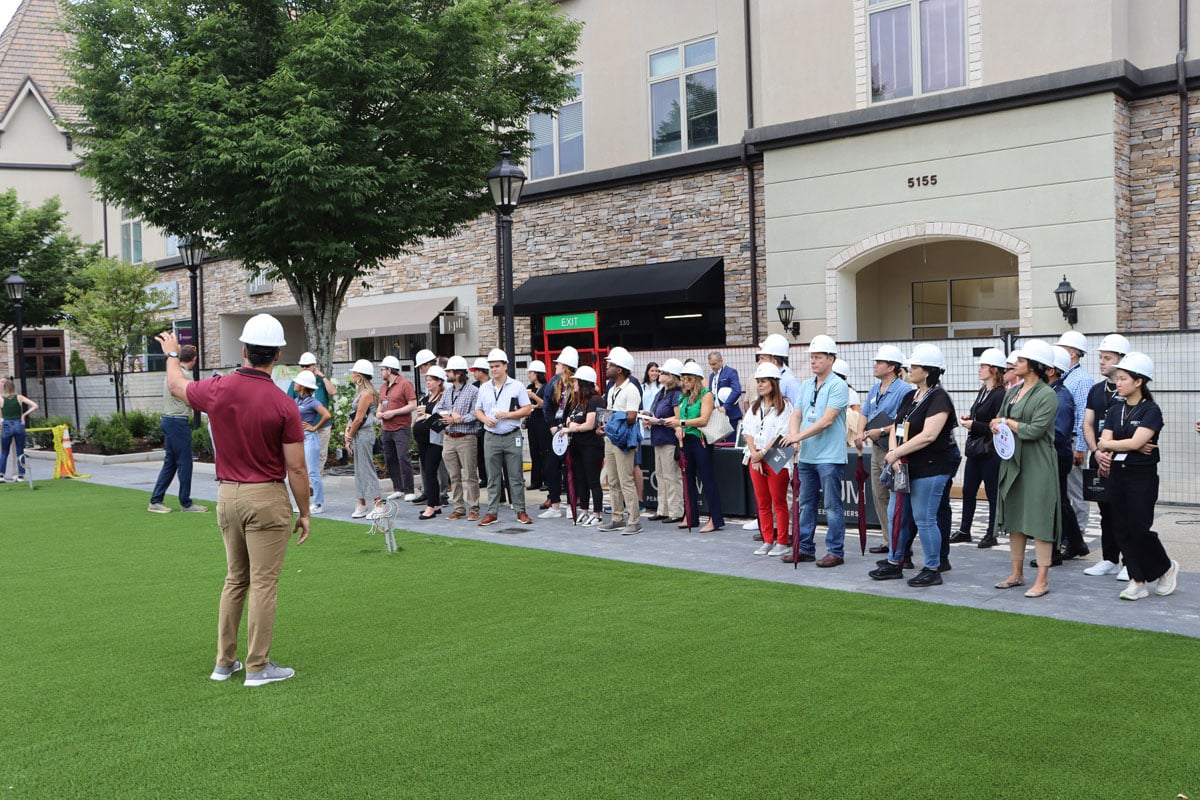
If you’ve been to or near the Forum in the past few months, you’ve probably noticed cranes and construction crews. The anticipation of the first phase of renovation of the 22-year-old retail center has left a lot of Peachtree Corners residents as well as nearby patrons excited to see changes.
The Forum administration invited the media for a hard hat tour on July 17. The event showcased the redevelopment progress ahead of The Plaza’s grand opening on Aug. 8.
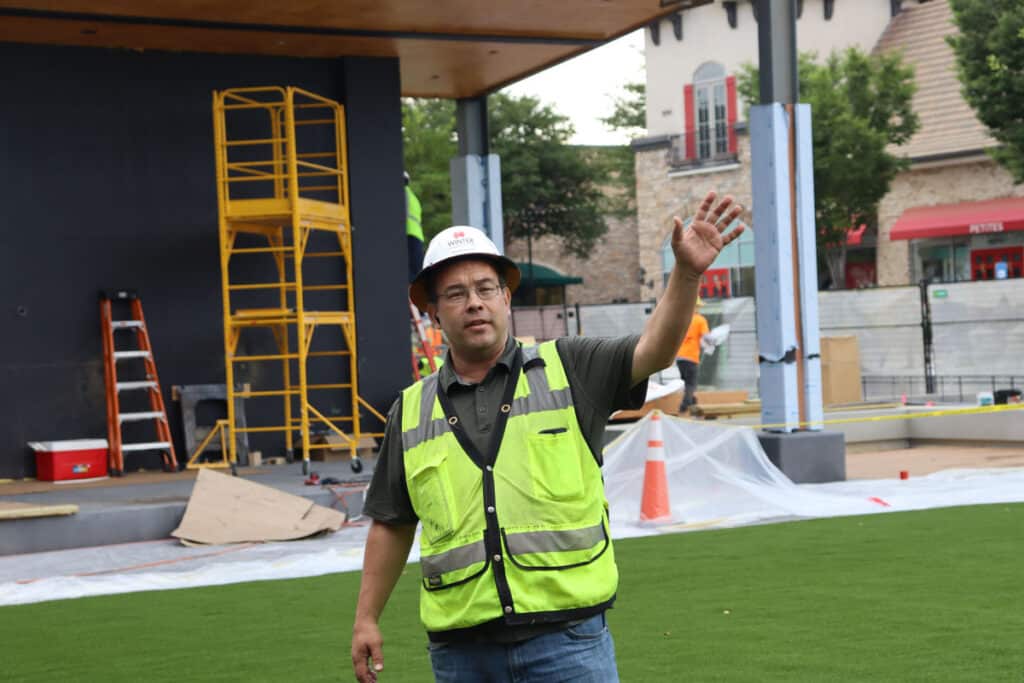
Scrumptious bites incoming
Executives from the development and leasing teams joined on-site management and led attendees around the new central gathering space, guest amenities and Politan Row, the newly created 10,000-square-foot food hall.
Dining concepts from veterans at Sheesh, Twenty-Six Thai and newbie Gekko Kitchen were the first food vendors announced for the space, which is expected to open in January.
“We can’t wait to introduce the Peachtree Corners community to our food hall experience,” said Politan Group CEO Will Donaldson in a news release. “Every detail from the design to the bar program to the cuisine is thoughtfully curated to inspire guests to not only mingle with one another but to connect with our incredible restaurateurs and discover new favorites.”
During the tour, Donaldson explained that eventually there will be seven different global cuisines in the Politan Row food court at the Forum featuring well-known and up-and-coming local talent. Once complete there will be a central bar, a private event venue and a covered outdoor patio.
“One of the things that we’re excited about is this unique design that we’ve come up with, that’s very specific to this area,” he said. “We’ll be open seven days a week for lunch and dinner. Whether you’re with a group for lunch or with your family, it works great for multiple settings.”
Twenty-six Thai owner Niki Pattharakositkul said the restaurant will work with local vendors to source the freshest meats and produce possible.
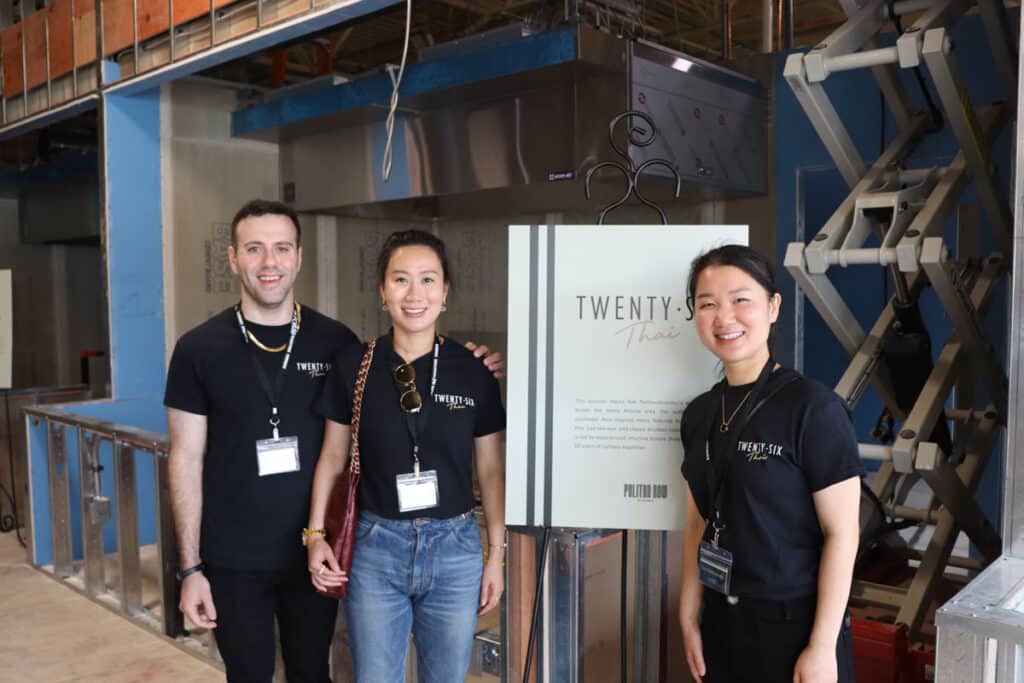
“There are certain types of produce and protein we try to source locally, but sauces and the more exotic produce and herbs, we have to import from Thailand,” she said. “Our brand is trying to move towards doing things locally and sustainably.”
Working with organizations such as Georgia Grown limits the use of large food distribution companies. Since starting Twenty-six Thai in 2016, Pattharakositkul has launched seven locations across metro Atlanta, including at Politan Row’s Ashford Lane and Colony Square.
The eatery describes itself as an “authentic wok-fired Southeast Asia-inspired menu featuring items such as pad Thai, pad see ewe and classic drunken noodles.”
Sheesh, a Mediterranean concept that uses simple, wholesome ingredients prepared with unique spices and blends, is run by corporate executive chef Charlie Sunyapong and director of operations Raquel Stalcup. The two are also members of the group behind full-service restaurants Stäge at Town Center and Pêche at the Forum.
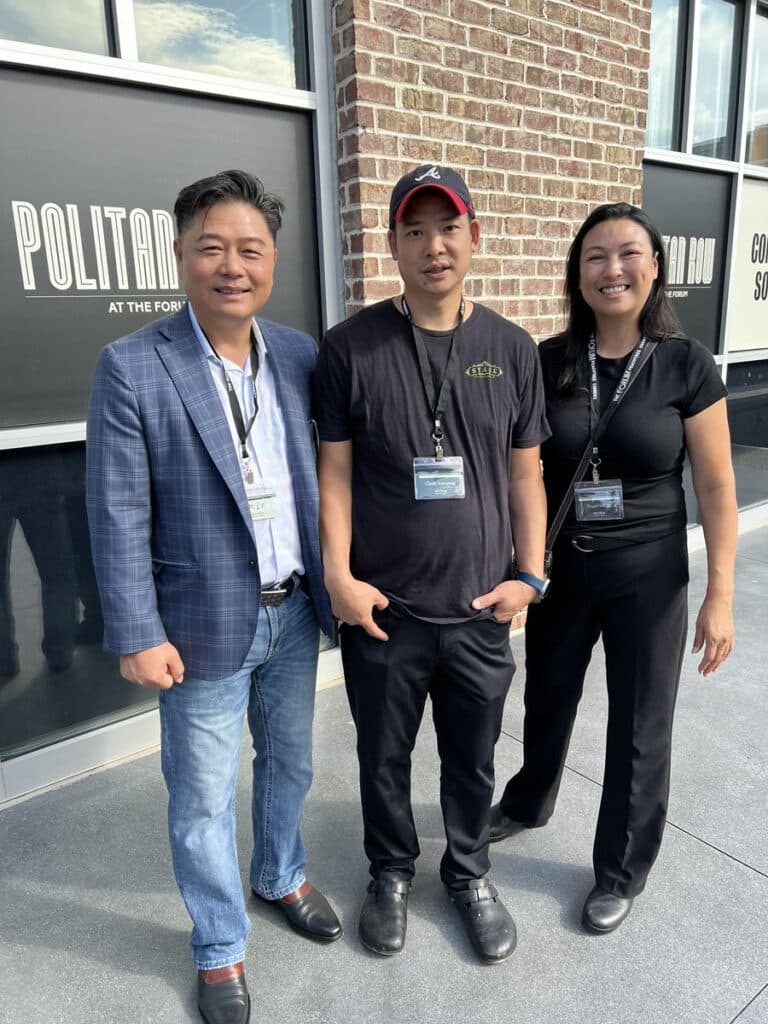
The popularity of those suburban concepts has already taken off. With Sheesh, they’re looking to do something different.
“There are going to be some things that are unique to Sheesh that you’re not going to get at the other places,” said Sunyapong. “You’re not getting a whole restaurant; this is quicker fare.”
Gekko Kitchen, a former food truck transformed into a hibachi and ramen experience, will be serving fresh, fast bowls that are more colorful and lighter than traditional hibachi fare.
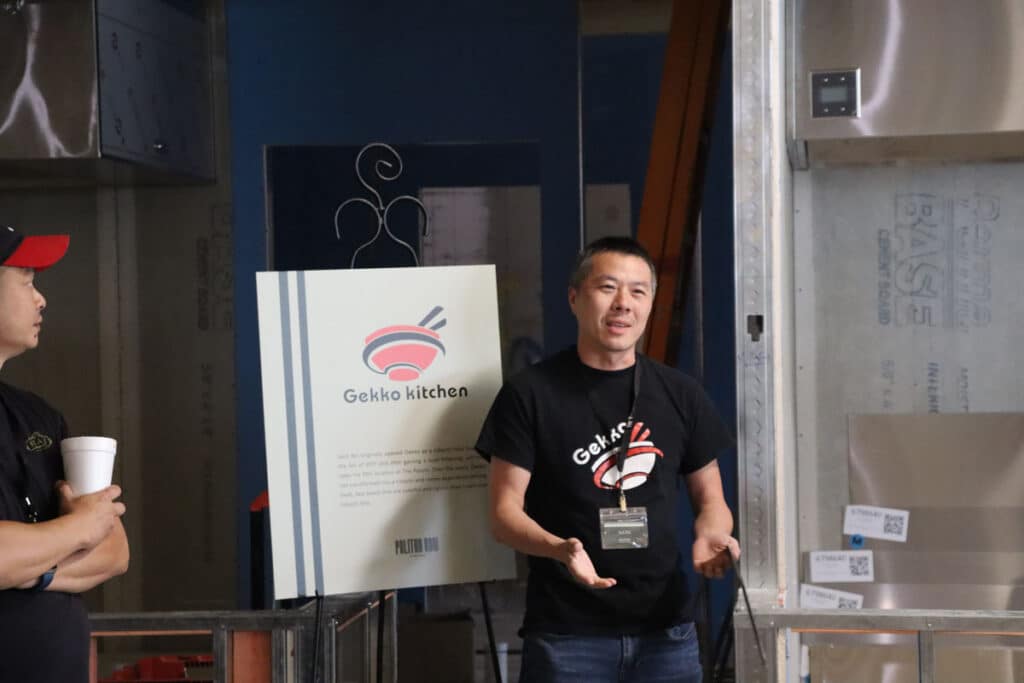
Gathering spots
Development Manager Nick Lombardo explained that NAP is moving away from building big construction projects from scratch like Colony Square in Midtown Atlanta and Avalon in Alpharetta.
“As a company, North American Properties pivoted around 2020 from building big ground-up construction to more redevelopment with already existing properties,” he said. “With the thought of great assets that just need a little more attention Infused into them to create value, we bought the Forum in 2022.”
He said that value-add propositions done at The Forum will create a more walkable center.
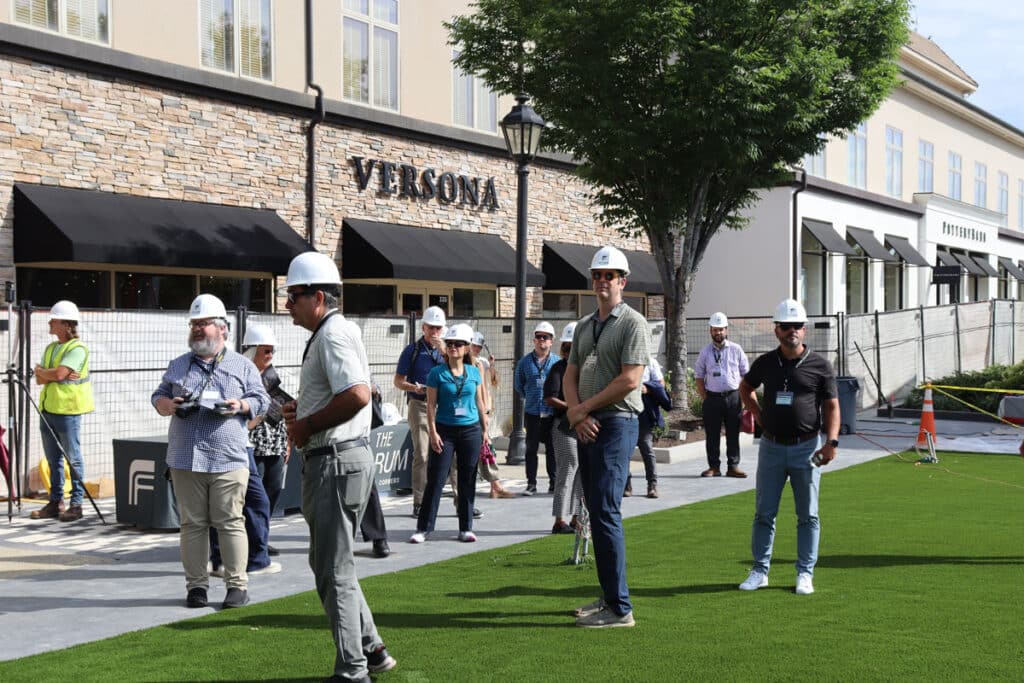
“Trying to compete with the internet on convenience is a very tough task, so the way we differentiate is by experiences,” he said. “We host between 150 to 200 events every year. We have things like concerts, wellness and fitness events and we have child playtime events. Our marketing team does a great job and they’re the differentiator when it comes to what makes our property stand out.”
By the first week of August, a large gathering space will be unveiled in the central area of the property between Pottery Barn and seafood restaurant Pêche. It will have a nine-foot LED screen capable of hosting movie nights and sports viewing. There will also be musical performances featuring local artists.
“We’re not in competition with Town Center,” said Charlotte Hinton, marketing manager at The Forum. “Town Center has gates like a real music festival and we’re more like a ‘chill and enjoy the music’ vibe where you can grab a beer and hang out or maybe kind of walk around.”
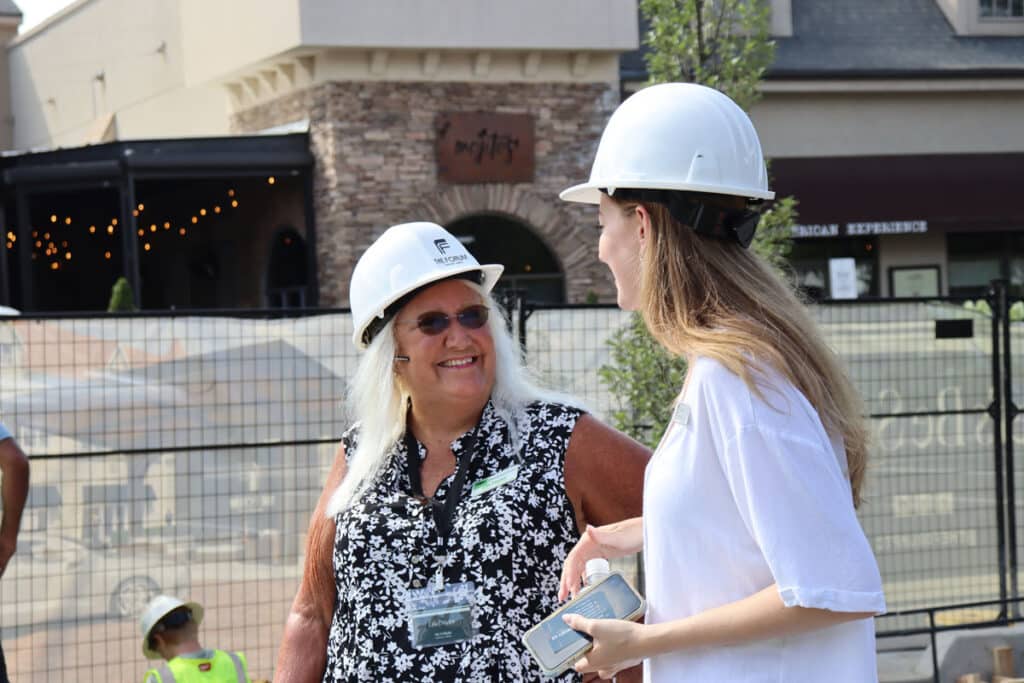
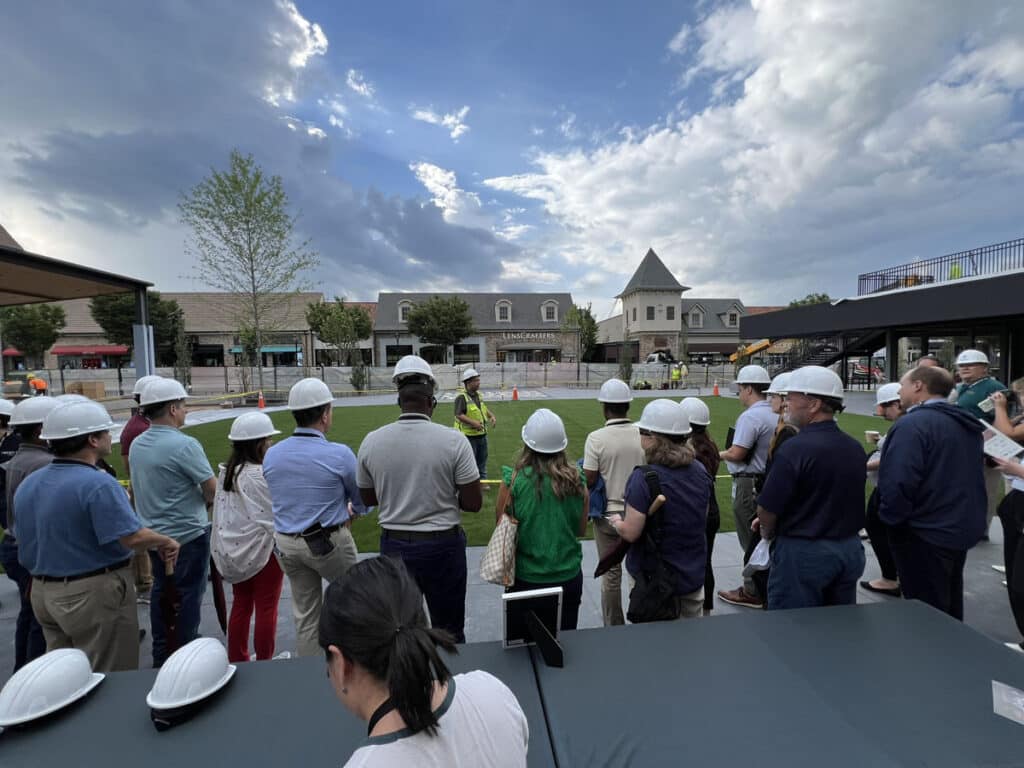
The smaller space and artificial turf are unlike the Town Center space where attendees spread blankets and bring chairs. The Forum will have furniture and seating in the space so folks can just gather and either enjoy time with family or partake in events.
The Forum will also offer valet parking on a limited schedule at that end of the property.
More improvements
Although the construction equipment will have moved out, the jewel box building will house a yet-to-be-named restaurant that will open early next year.
“We’re pretty much done with what we’re doing as far as landlord work,” said Lombardo. “We ask our tenants to bring their brand and their design and their material pallet and put that on the building to express their brand identity. They know their brand better than we do. They know how to best design their building and how it functions and works.”
It’s the same process with retail stores, he added.

“We always ask all of our new tenants to come in here when they’re building their storefront,” he said. “They’re not just selling their clothes; they’re selling a lifestyle in the brand so we ask them to push their brand out to the street.”
Even with the new spaces, there will be no shortage of parking, Lombardo added. “There’s plenty of parking behind these buildings,” he said pointing toward Pêche. “What we’ve done is enhance the connectivity to those areas. We’ve redone this breezeway and we’re adding lighting and connecting the parking lot to the main boulevard here. The goal is to replace cars with people and activity and bring a sense of community to the property.”
Related
Business
Taste of Peachtree Corners: PCBA Showcases Local Restaurants
Published
1 week agoon
July 17, 2024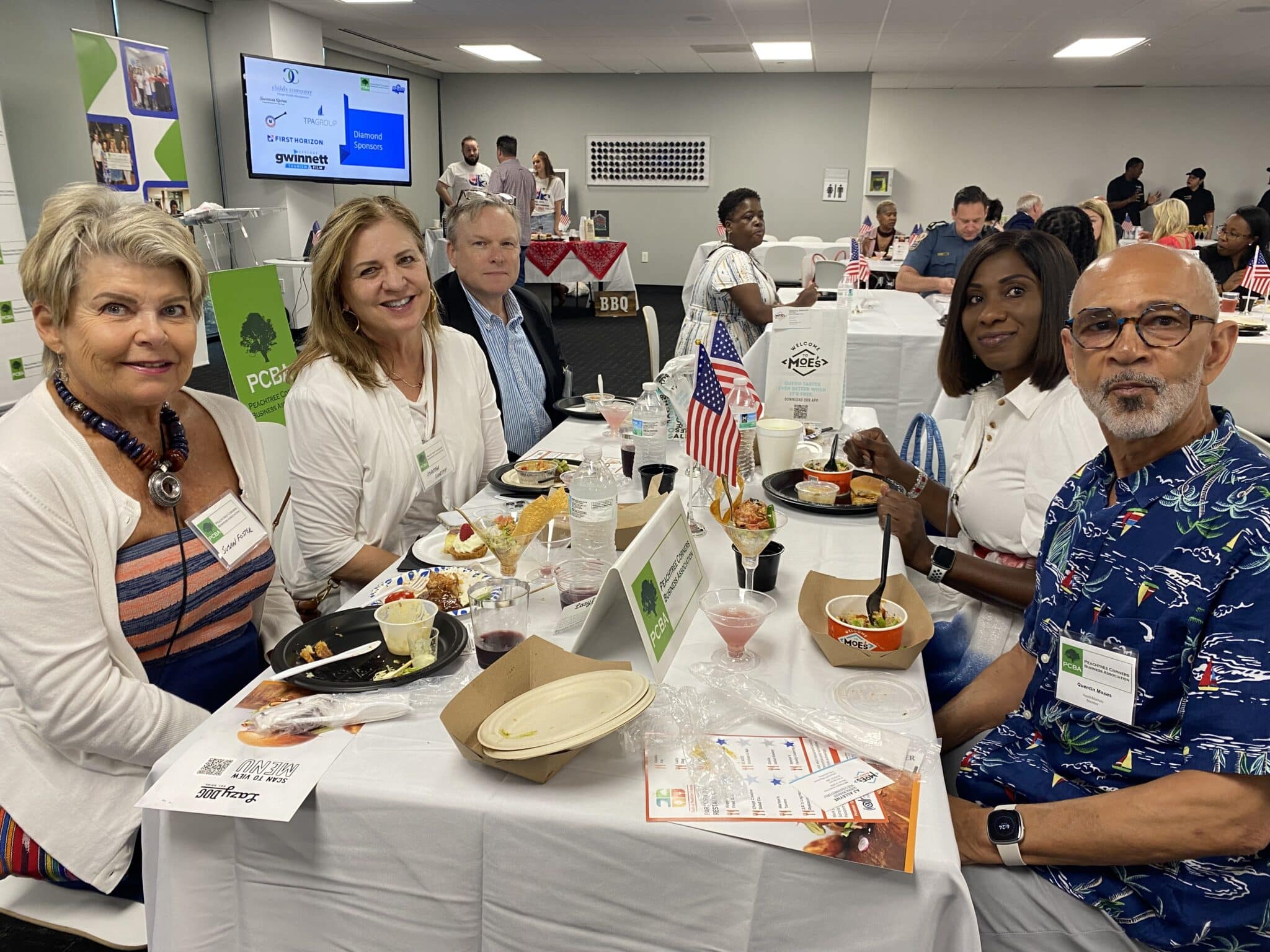
The Taste of Peachtree Corners has been in the works for years, but the COVID-19 pandemic put many key events on hold for the Peachtree Corners Business Association (PCBA).
But luckily this year, the dedicated staff of volunteers successfully executed a memorable event and introduced a lot of local business owners to their neighboring restaurants and caterers.
As I walked up to the Community Chest Room at Peachtree Corners City Hall on June 27, there was a line outside the door. I later found out that over 100 people had registered to attend the event. I got checked in quickly and was faced with a “passport” of 10 Peachtree Corners restaurants serving everything from high-end bakery items to good old-fashioned barbecue, and modern twists on seafood and American cuisines.
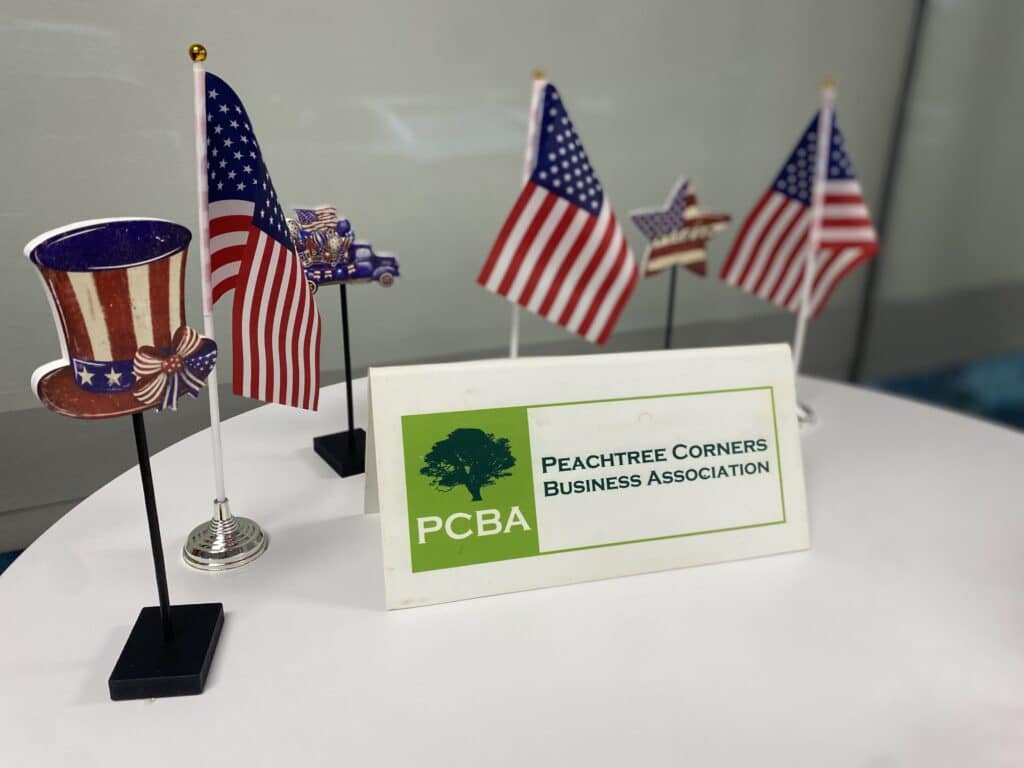
Let’s talk about the food
The idea was to visit all 10 restaurants and collect stars while trying samples and small plates. My first stop was Firebirds Wood Fired Grill, and they had my favorite – homemade chips and queso. The queso was smoky and mildly spicy with a great depth of flavor. What a great start. Next up was Chopt. Creative Salad Co. I had never heard of this restaurant before, but they blew me away with a perfect amuse-bouche of cherry tomato, pesto, mozzarella, and olive oil. These guys understand simple and fresh Mediterranean flavors.
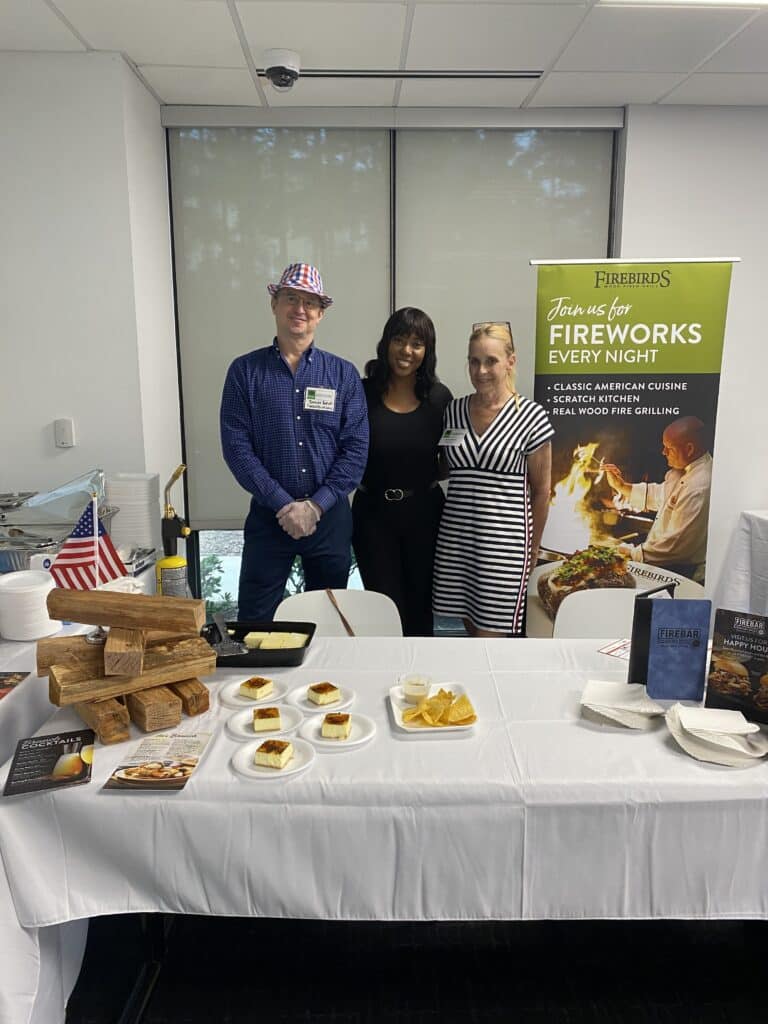
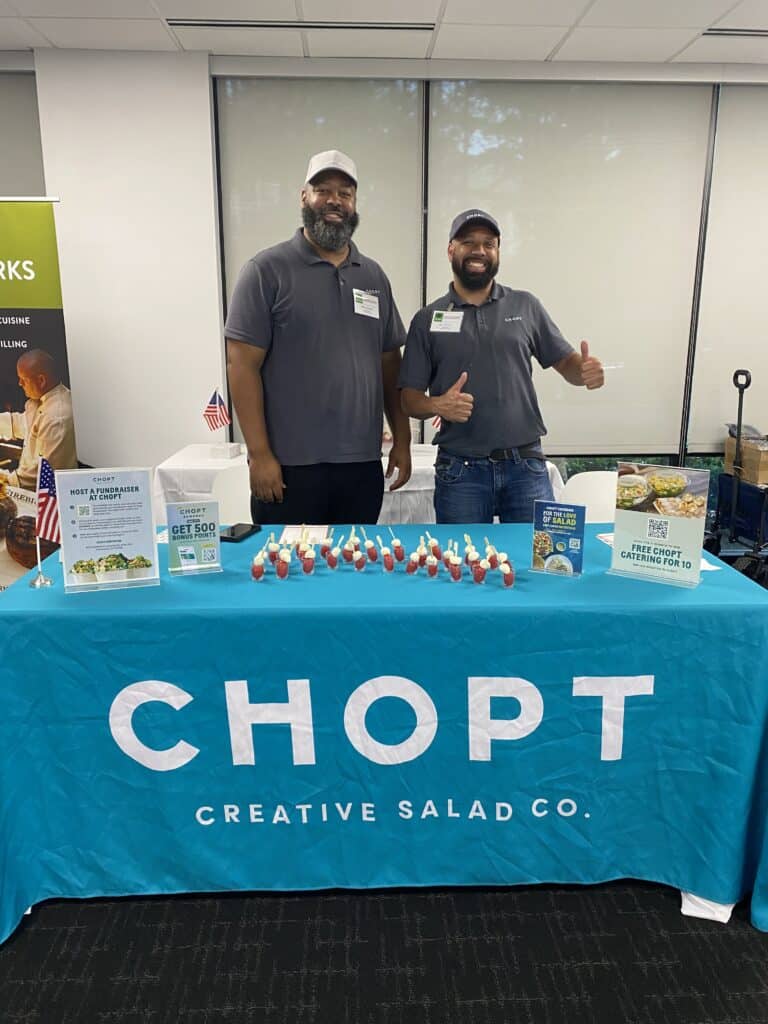

The folks from Marlow’s Tavern were also on-site serving shrimp and grits with jalapeno, spinach and tomato beurre blanc. This is definitely the style of elevated food I’ve come to expect from Marlow’s. And as a nice touch, they prepared a refreshing blueberry cocktail.
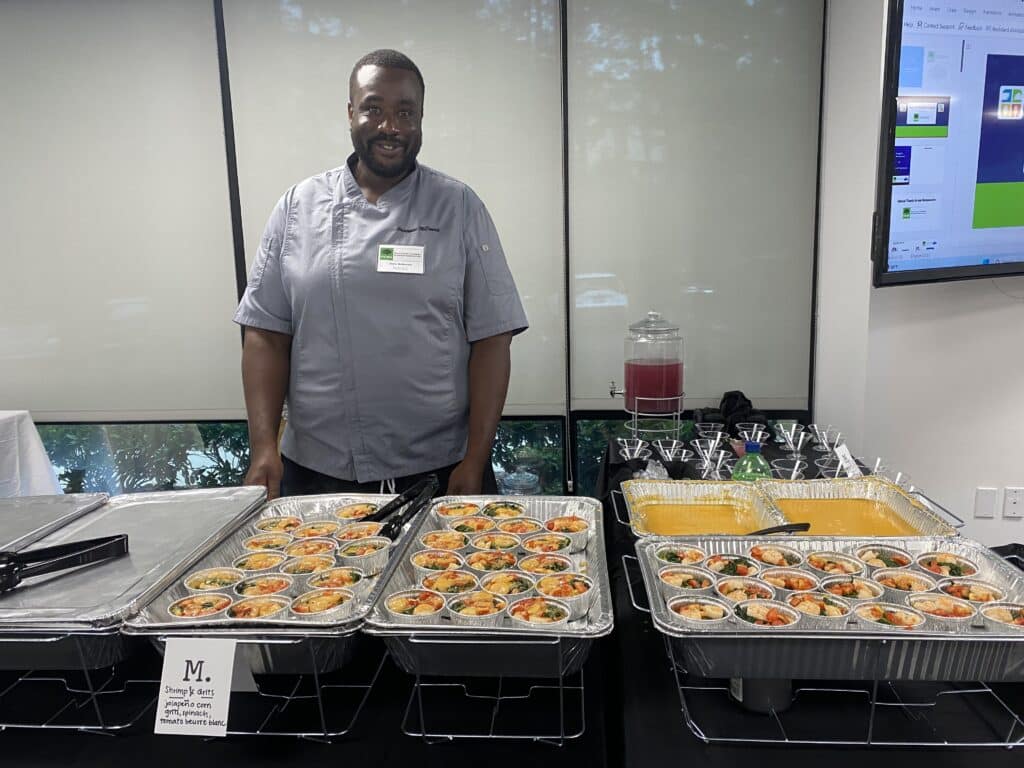
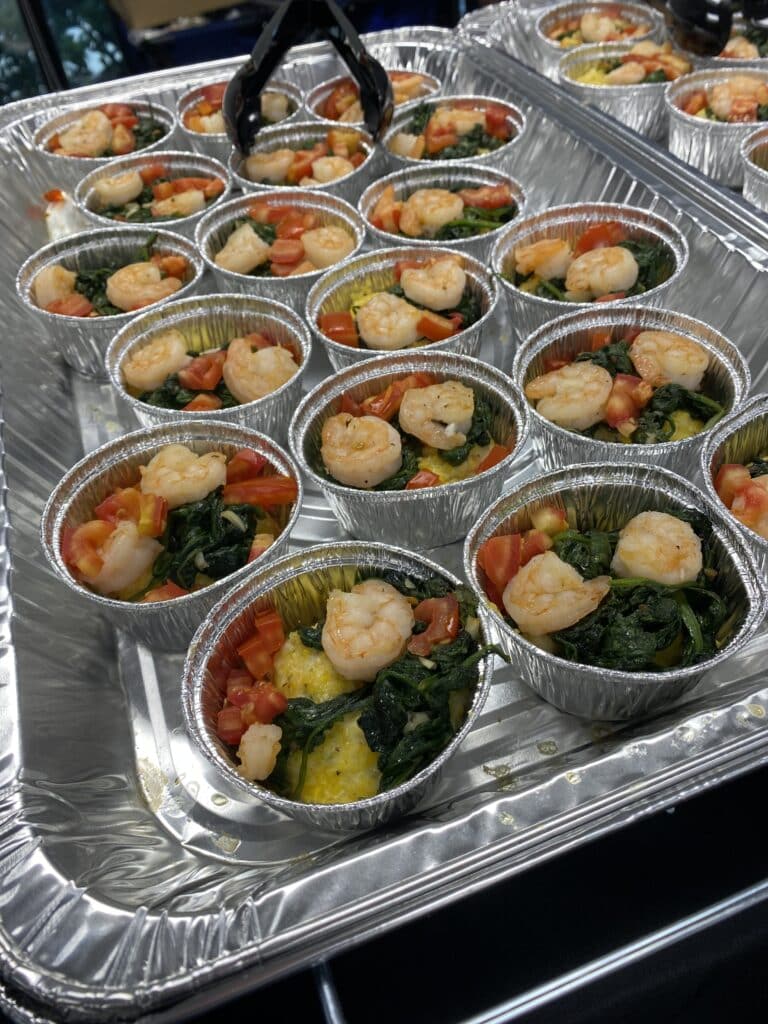
Another familiar face was set up on the other side of the room. J.R.’s Log House Restaurant served southern favorites like pulled pork sliders, baked beans and mac n’ cheese. I couldn’t pass this one up. The pulled pork was tender, tangy and saucy. Exactly what I want from a barbecue. Lazy Dog’s table really impressed me with its presentation. The tuna cup with rice, avocado and chili with chips on the side, was a real stunner.
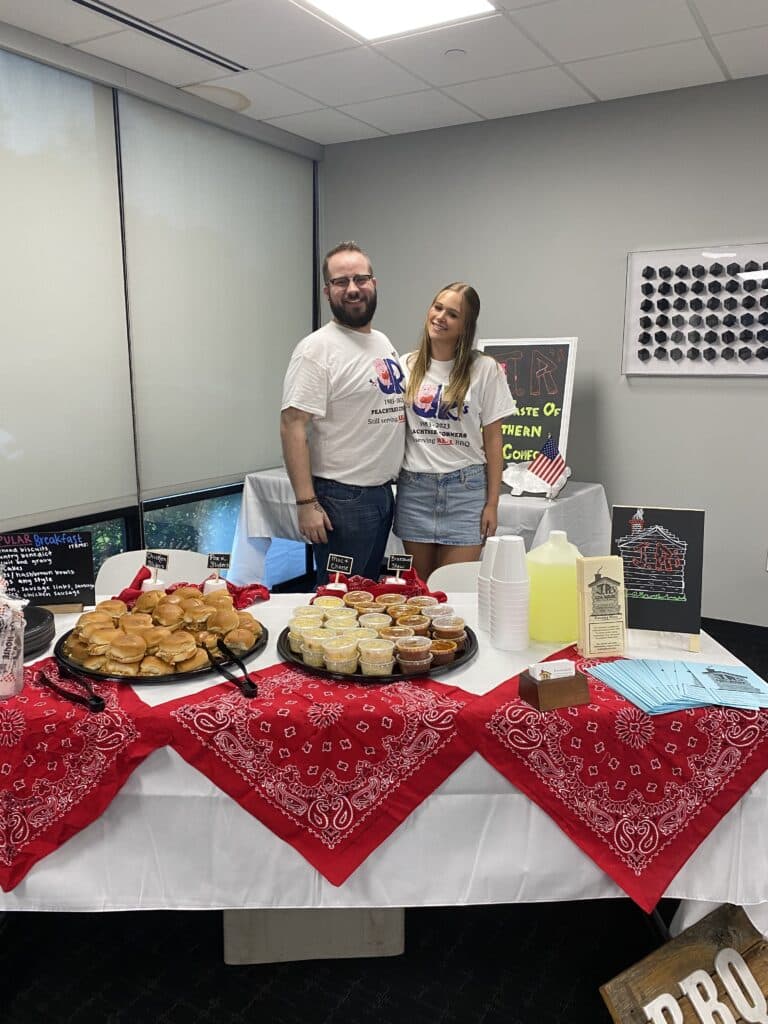
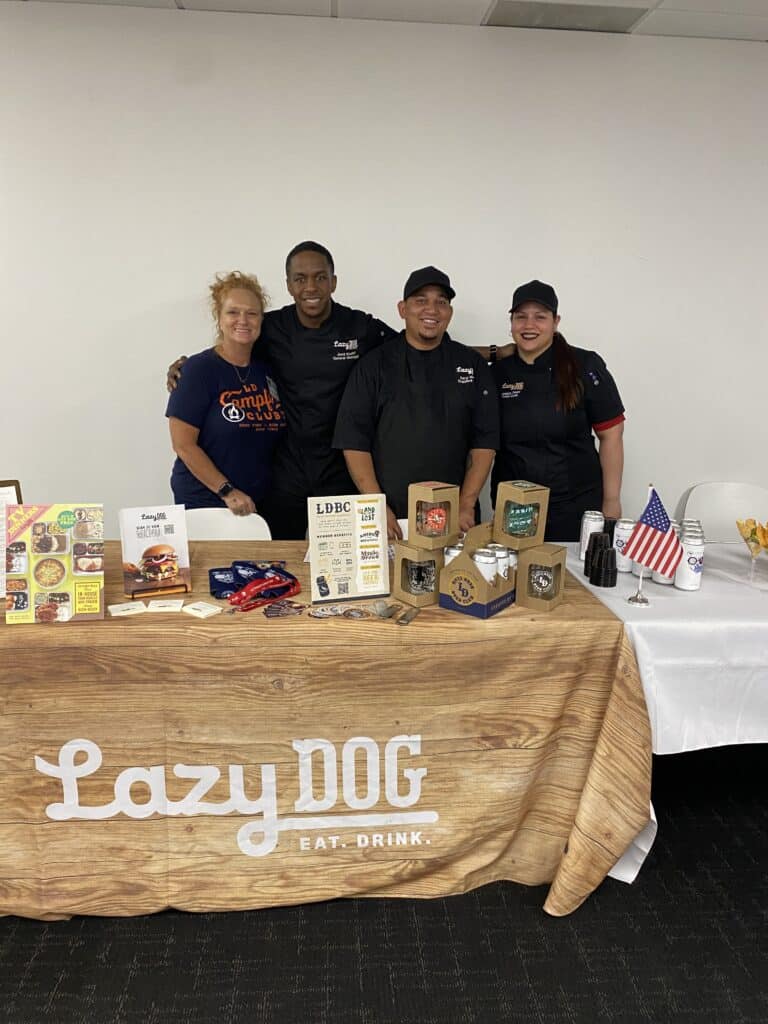
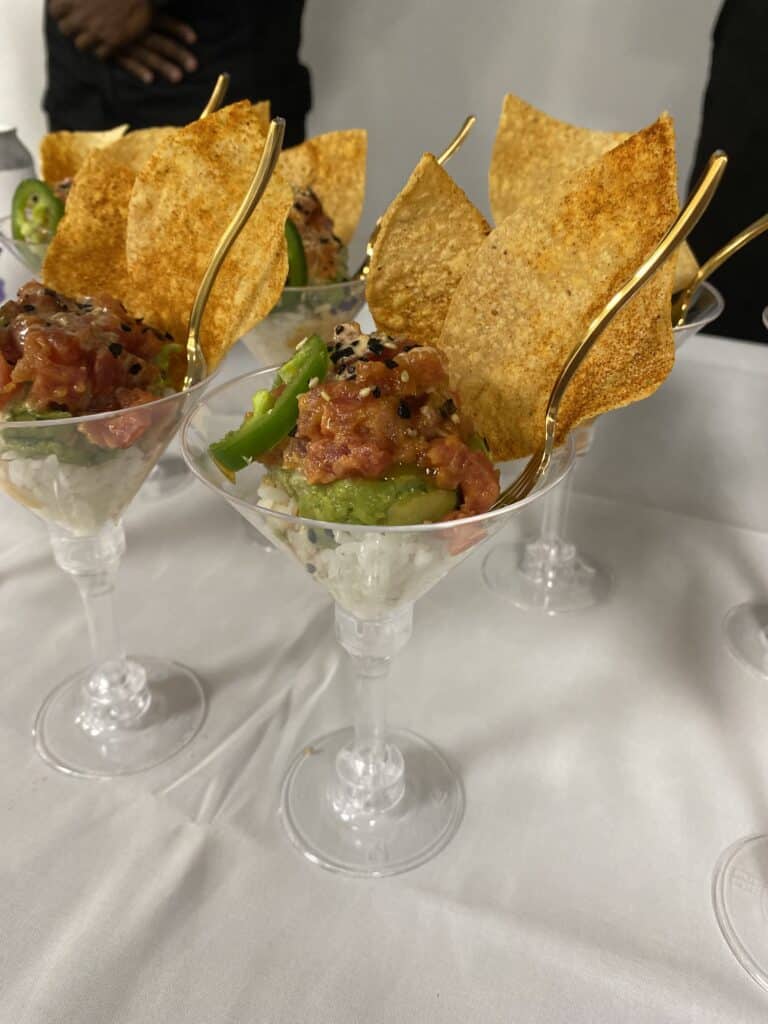
Moe’s Southwest Grill was also on-site handing out tasty tequila lime chicken with rice, avocado, and black beans. This super hearty and comforting entrée was followed by a seafood course from PECHE Modern Coastal. Crab cakes with a croissant pinwheel, roasted garlic and lemon aioli and arugula were on the menu and the flavor combinations were simply fantastic.
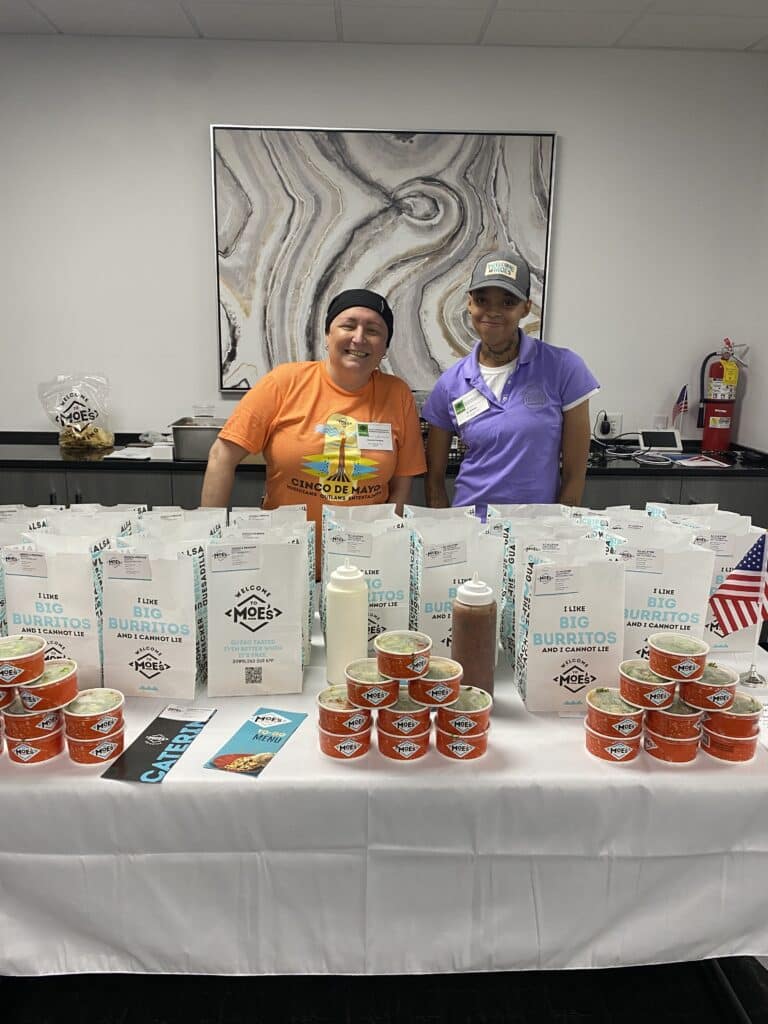
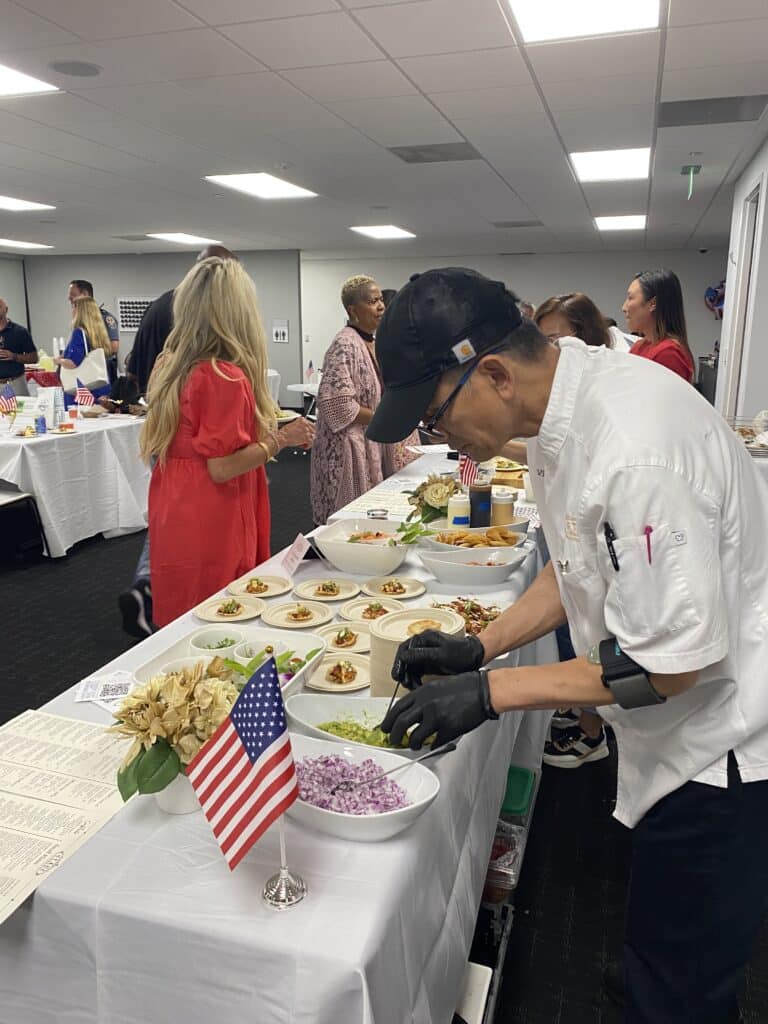
PECHE’s sister restaurant STAGE Kitchen & Bar was next door offering a tuna and salmon tostada with avocado, eel sauce, spicy mayo, and cilantro. This was easily one of my favorite bites of the night. The tostada was crunchy and light with clean and bright flavors. No kidding, I could probably eat this every day for lunch.
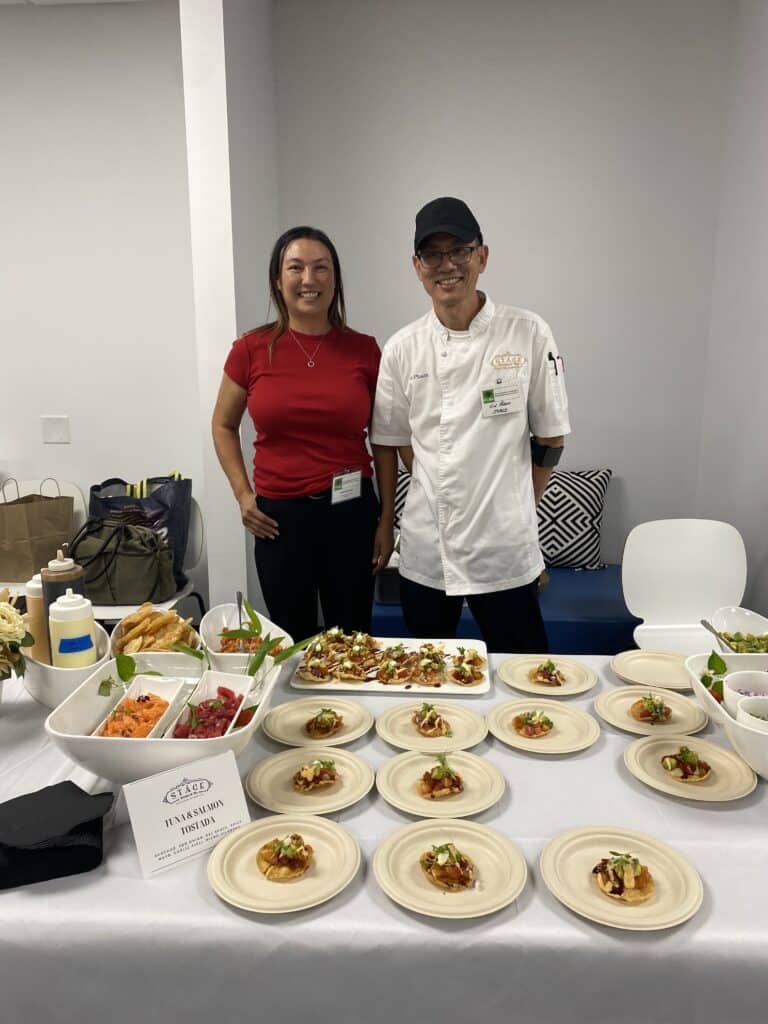
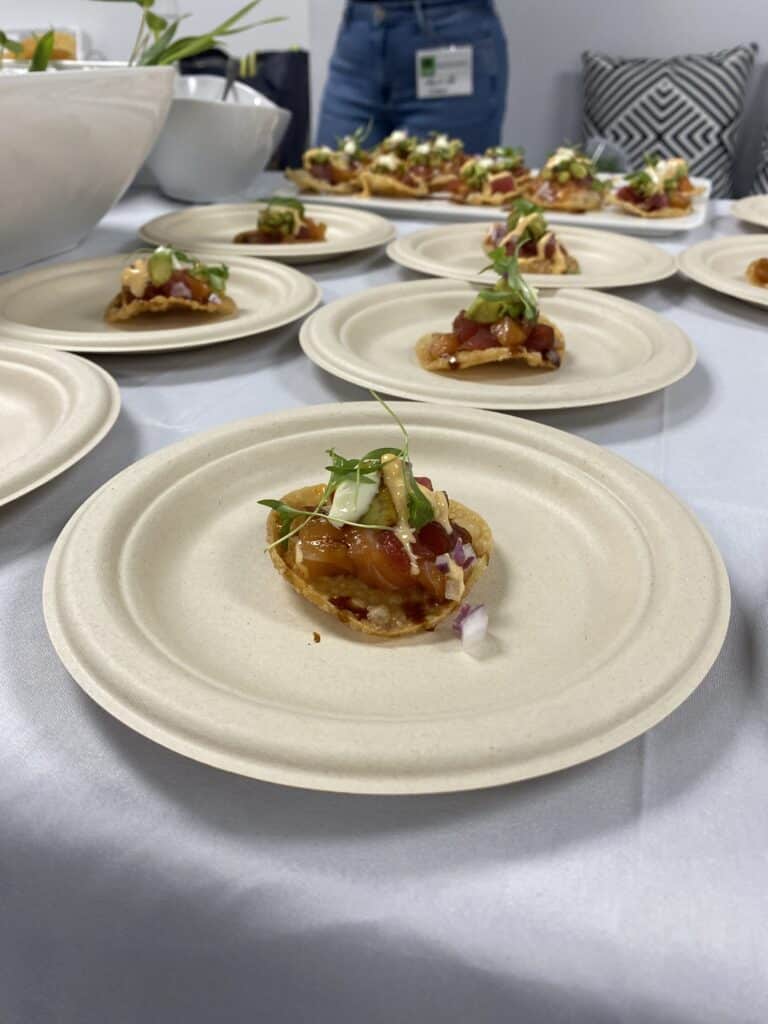
I moved on the Smoke’s Family Catering and owner Phillip Smoke had whipped up enough barbecue to feed an army. I had the pleasure of trying the smoked chicken with potato salad and it was the perfect pairing. Last but not least: dessert. I capped off the evening with a beautiful chocolate ganache-filled croissant with perfect lamination and flaky texture.
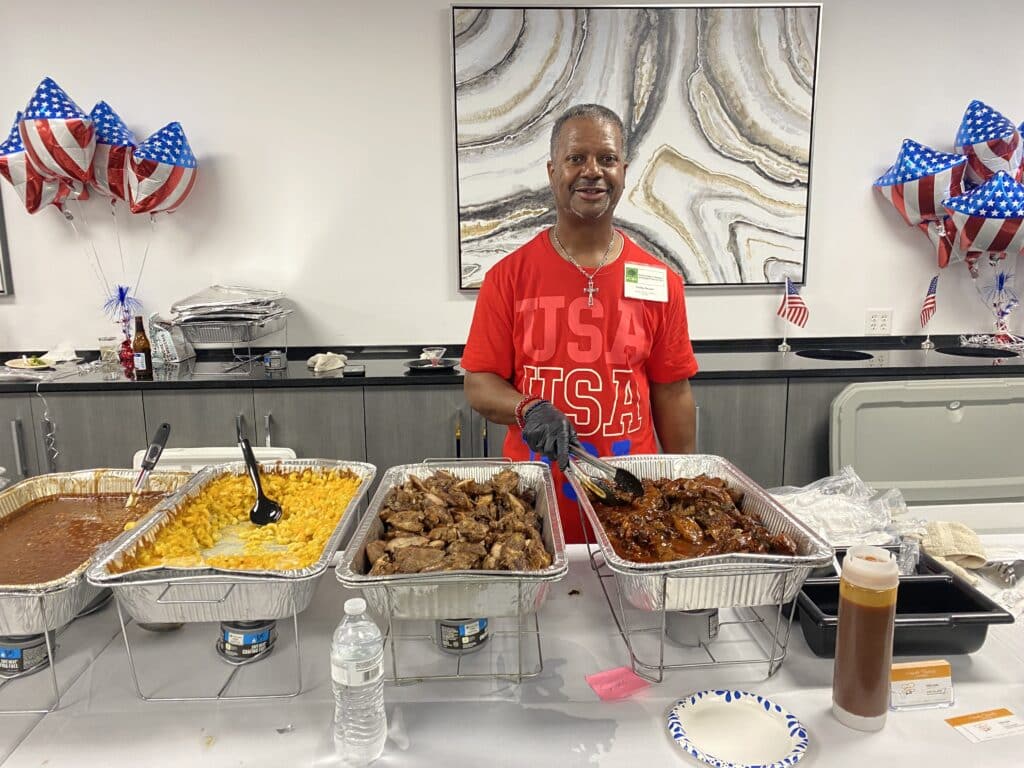
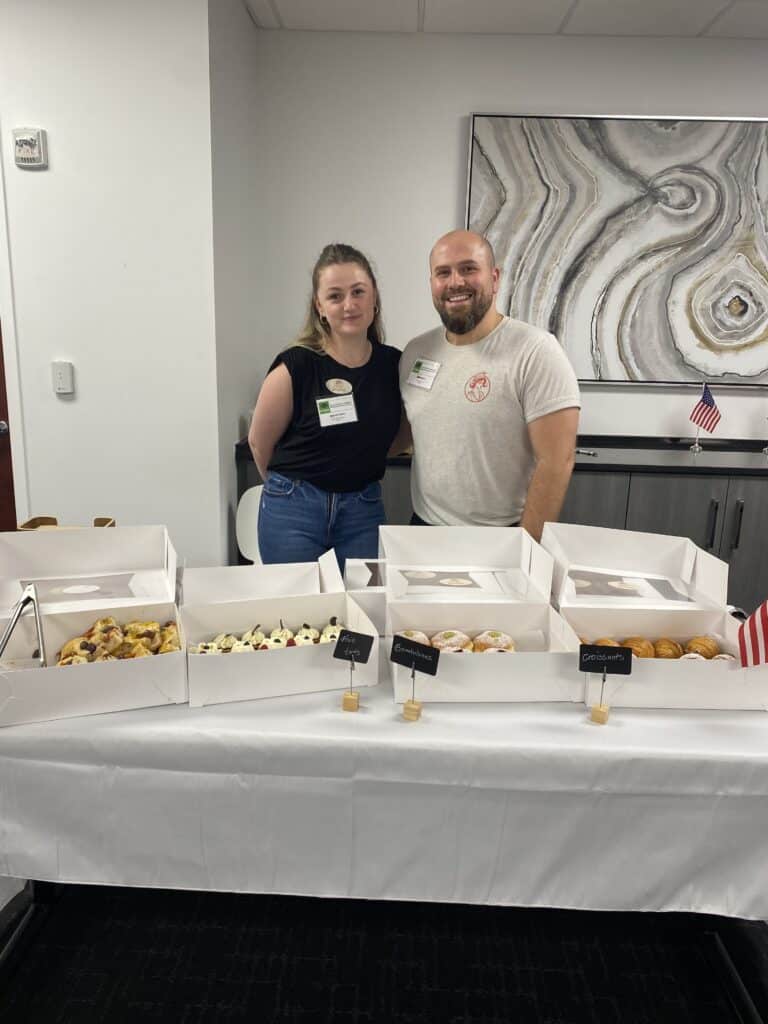
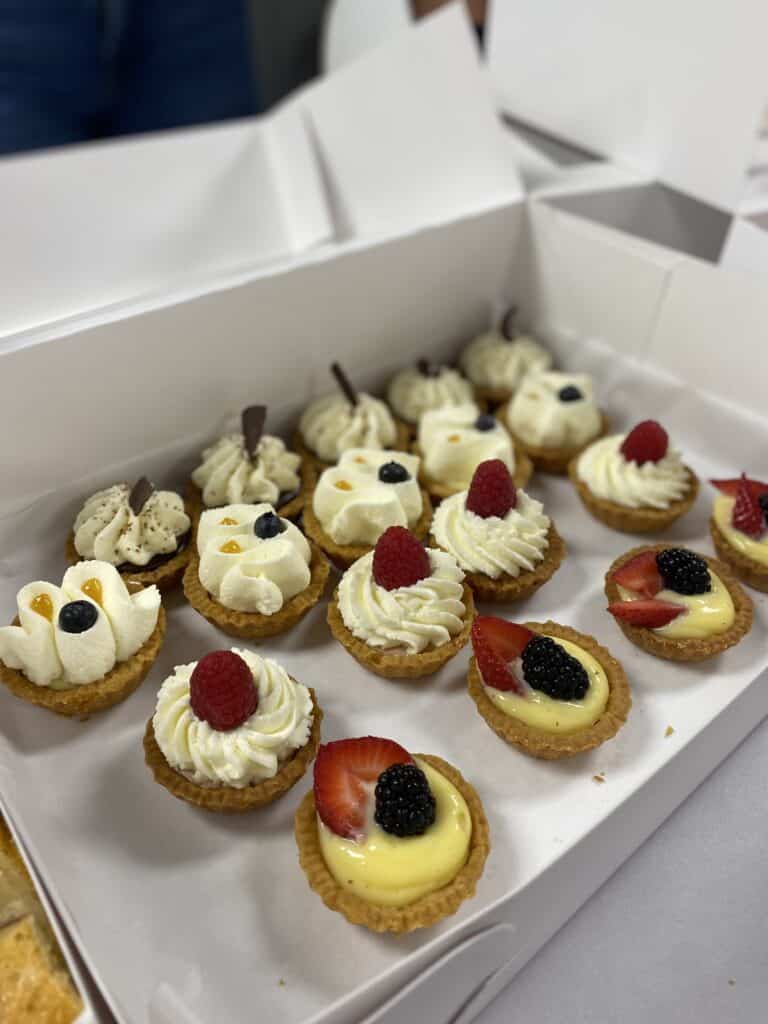
The inspiration behind the event
With a (very) full stomach, I caught up with PCBA President Lisa Proctor to talk about the event.
“We knew that COVID was really hard on a lot of our restaurants to get people back in,” said Proctor. “We wanted to do it in June because we wanted to celebrate our military. Everybody remembers them maybe on Memorial Day or different things, but June is the 80th anniversary of D-Day.”
“The military is always close to our heart,” she added. “We’re also very proud of our restaurants. They all have gone above and beyond.”
Tonight, the PCBA was honoring the Armed Forces and its brave veterans while bestowing two donation checks to very worthy causes.
The first check for $500 went to Folds of Honor. Since 2007, Folds of Honor has provided life-changing scholarships to the spouses and children of America’s fallen or disabled military. And now, their mission expands to the families of America’s first responders.
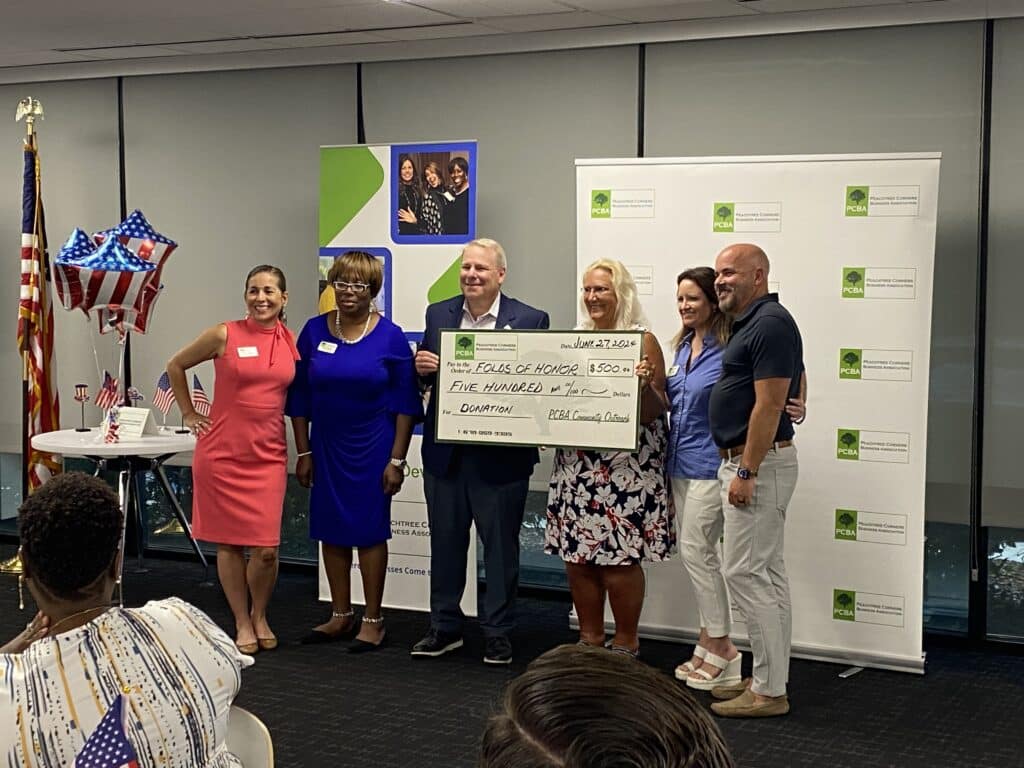
The second check for $500 was given to Light Up the Corners, a 501(c)(3) volunteer organization with an annual glowing, flashing, blinking, shining, nighttime running party and fundraiser in one. All proceeds from the event go to benefit less fortunate children and families in the Peachtree Corners community who are struggling by giving them the chance to participate in life-enhancing programs and activities at the Fowler YMCA.

Over the past 12 years, the PCBA has awarded 19 scholarships and donated more than $156,000+ back to the Peachtree Corners community.
Related
Business
Local Resident Opens AtWork Location in Peachtree Corners
Published
2 weeks agoon
July 10, 2024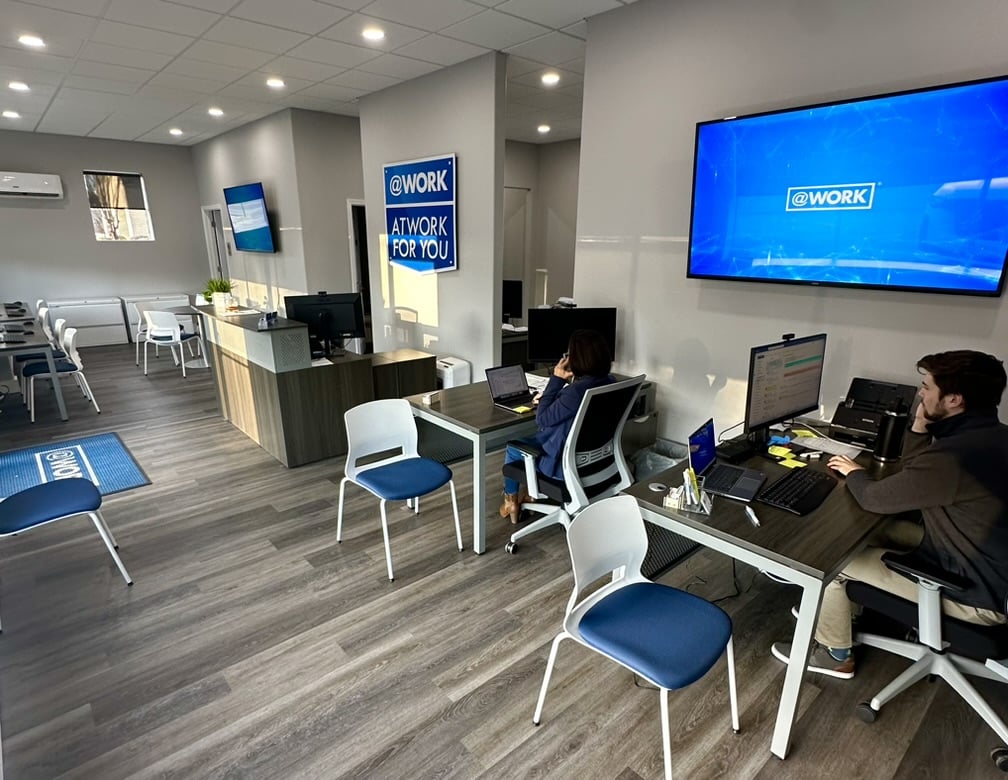
AtWork, one of nation’s leading staffing franchises, has opened its third Metro Atlanta location in Peachtree Corners, Georgia at 6185 Buford Highway, Suite E-100.
AtWork Peachtree Corners is locally-owned by Kamal Bhatia, an immigrant from India with decades of experience in hospitality and as the Senior Vice President of Operations of Atlanta-based Action Bartending School.
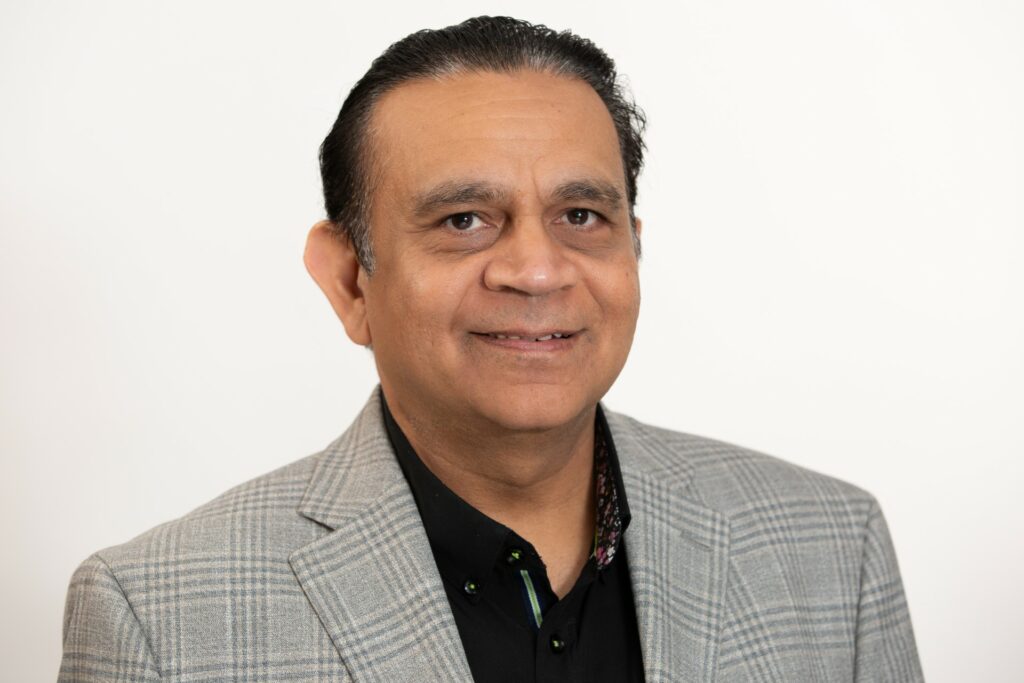
“There is an incredible need for AtWork’s services in Peachtree Corners,” said Bhatia. “Since migrating here in 1996, I’ve witnessed Atlanta evolve and sprout new communities north of the city, including my own. Peachtree Corners has become a hub for thriving businesses, and my goal with this location is to be a key resource between companies and job seekers to support the continued growth of our local economy.”
Bhatia’s son and daughter will assist him in the business.
“This is an opportunity to create a legacy company to ensure our community is supported for generations to come,” he said.
For more than three decades, AtWork’s mission has been to connect people with jobs and jobs with people. With more than 100 locations nationwide, AtWork puts nearly 40,000 individuals to work each year in administrative, light-industrial, accounting and finance, hospitality, IT and management-level positions at some of the nation’s largest and most recognizable companies.
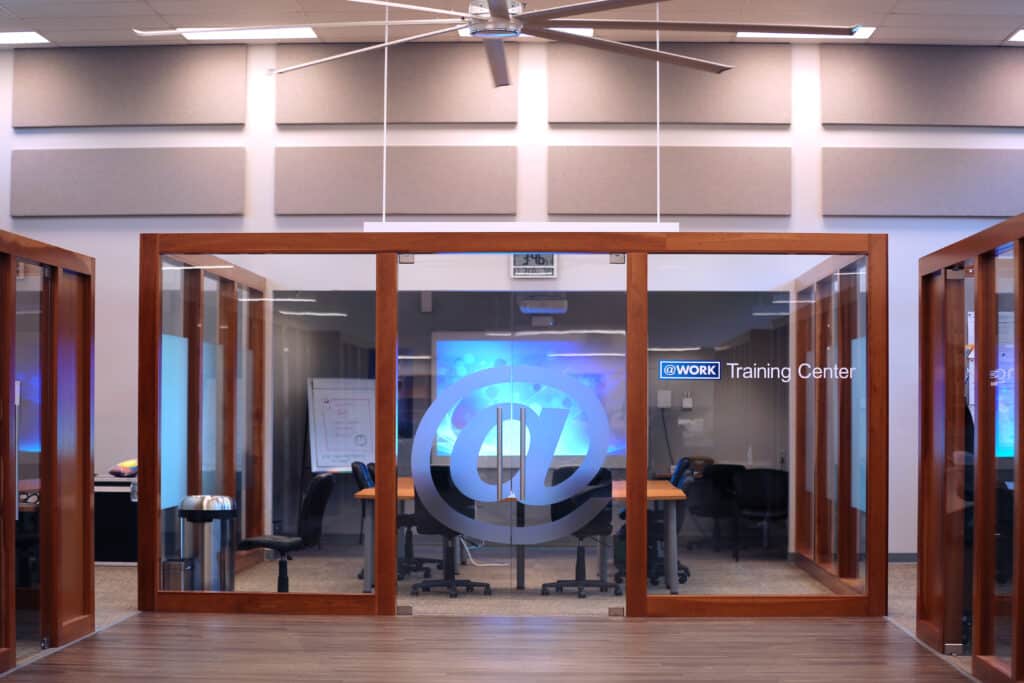
“We’re proud to open our doors in Peachtree Corners and provide a common place for both job seekers and growing businesses to turn for staffing solutions,” said Jason Leverant, President and COO of AtWork.
“AtWork will serve as a key resource to help employees thrive, businesses prosper and communities flourish. Kamal is the perfect partner to champion our mission and be a servant leader in her local community,” he added.
Related
Read the Digital Edition
Subscribe
Keep Up With Peachtree Corners News
Join our mailing list to receive the latest news and updates from our team.
You have Successfully Subscribed!

What’s going on at Jones Bridge Park and the Challenges of Urban Development

Taste of Peachtree Corners: PCBA Showcases Local Restaurants

The Forum Gives Sneak Peek of New Eateries and Community Spaces

Southwest Gwinnett Mayors Share Visions for the Future

8 Events Happening In and Around Peachtree Corners This August

Peachtree Corners Shines Bright with Light Up the Corners Glow Race this August

Peachtree Corners Shines Bright with Light Up the Corners Glow Race this August

The Forum Gives Sneak Peek of New Eateries and Community Spaces

8 Events Happening In and Around Peachtree Corners This August

Southwest Gwinnett Mayors Share Visions for the Future

Taste of Peachtree Corners: PCBA Showcases Local Restaurants

What’s going on at Jones Bridge Park and the Challenges of Urban Development

Local Resident Opens AtWork Location in Peachtree Corners

CHRIS 180 Expands its Services into Gwinnett County [Podcast]

Light up the Corners [Video]

Capitalist Sage: Business Leadership in Your Community [Podcast]

Cliff Bramble: A Culinary Adventure through Italy

Top 10 Brunch Places in Gwinnett County

A Hunger for Hospitality

THE CORNERS EPISODE 3 – BLAXICAN PART 1

Top 10 Indoor Things To Do This Winter

The ED Hour: What it takes to Remove Barriers from Education
Peachtree Corners Life
Topics and Categories
Trending
-
Business1 week ago
Taste of Peachtree Corners: PCBA Showcases Local Restaurants
-
Business2 days ago
The Forum Gives Sneak Peek of New Eateries and Community Spaces
-
City Government4 days ago
Southwest Gwinnett Mayors Share Visions for the Future
-
Around Atlanta4 days ago
8 Events Happening In and Around Peachtree Corners This August







